(CNN) -- Forecasting the major international stories for the year ahead is a time-honored pastime, but the world has a habit of springing surprises. In late 1988, no one was predicting Tiananmen Square or the fall of the Berlin Wall. On the eve of 2001, the 9/11 attacks and the subsequent invasion of Afghanistan were unimaginable. So with that substantial disclaimer, let's peer into the misty looking glass for 2013.
More turmoil for Syria and its neighbors
If anything can be guaranteed, it is that Syria's gradual and brutal disintegration will continue, sending aftershocks far beyond its borders. Most analysts do not believe that President Bashar al-Assad can hang on for another year. The more capable units of the Syrian armed forces are overstretched; large tracts of north and eastern Syria are beyond the regime's control; the economy is in dire straits; and the war is getting closer to the heart of the capital with every passing week. Russian support for al-Assad, once insistent, is now lukewarm.
Amid the battle, a refugee crisis of epic proportions threatens to become a catastrophe as winter sets in. The United Nations refugee agency says more than 4 million Syrians are in desperate need, most of them in squalid camps on Syria's borders, where tents are no match for the cold and torrential rain. Inside Syria, diseases like tuberculosis are spreading, according to aid agencies, and there is a danger that hunger will become malnutrition in places like Aleppo.
The question is whether the conflict will culminate Tripoli-style, with Damascus overrun by rebel units; or whether a political solution can be found that involves al-Assad's departure and a broadly based transitional government taking his place. U.N. envoy Lakhdar Brahimi has not been explicit about al-Assad's exit as part of the transition, but during his most recent visit to Damascus, he hinted that it has to be.
.cnnArticleGalleryNav{border:1px solid #000;cursor:pointer;float:left;height:25px;text-align:center;width:25px} .cnnArticleGalleryNavOn{background-color:#C03;border:1px solid #000;float:left;height:25px;text-align:center;width:20px} .cnnArticleGalleryNavDisabled{background-color:#222;border:1px solid #000;color:#666;float:left;height:25px;text-align:center;width:25px} .cnnArticleExpandableTarget{background-color:#000;display:none;position:absolute} .cnnArticlePhotoContainer{height:122px;width:214px} .cnnArticleBoxImage{cursor:pointer;height:122px;padding-top:0;width:214px} .cnnArticleGalleryCaptionControl{background-color:#000;color:#FFF} .cnnArticleGalleryCaptionControlText{cursor:pointer;float:right;font-size:10px;padding:3px 10px 3px 3px} .cnnArticleGalleryPhotoContainer cite{background:none repeat scroll 0 0 #000;bottom:48px;color:#FFF;height:auto;left:420px;opacity:.7;position:absolute;width:200px;padding:10px} .cnnArticleGalleryClose{background-color:#fff;display:block;text-align:right} .cnnArticleGalleryCloseButton{cursor:pointer} .cnnArticleGalleryNavPrevNext span{background-color:#444;color:#CCC;cursor:pointer;float:left;height:23px;text-align:center;width:26px;padding:4px 0 0} .cnnArticleGalleryNavPrevNextDisabled span{background-color:#444;color:#666;float:left;height:23px;text-align:center;width:25px;padding:4px 0 0} .cnnVerticalGalleryPhoto{padding-right:68px;width:270px;margin:0 auto} .cnnGalleryContainer{float:left;clear:left;margin:0 0 20px;padding:0 0 0 10px}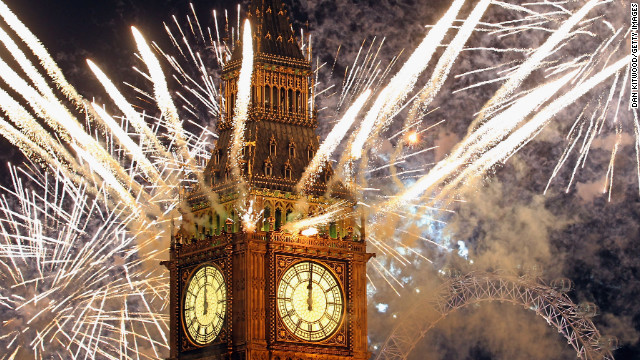 January 1: Fireworks light up the London skyline just after Big Ben struck midnight, kicking off 2012. Photographers worldwide captured deadly conflicts, devastating storms, presidential politics and other memorable moments throughout the year. Click through the gallery to see 2012 unfold from beginning to end. Then check out 75 amazing sports moments you missed this year. January 7: This portrait of Mitt Romney was made in New Hampshire shortly before its primary and appeared as part of an instantly classic photo essay by photographer Christopher Anderson for New York magazine. January 9: Members of the Alabama Crimson Tide hold the BCS trophy after defeating the LSU Tigers to win the National Championship college football title in New Orleans. January 10: "Voodoo spirits" walk the streets in Ouidah, Benin, for the annual Voodoo festival. Ouidah is the Voodoo heartland in this West African nation and thought to be the spiritual birthplace of Voodoo. January 10: A surfer walks past cargo containers washed ashore from the stricken container ship Rena at Waihi Beach in New Zealand. The ship was stranded on a reef for more than three months before breaking up and sinking in rough seas, littering beaches with cargo and debris. January 15: The cruise ship Costa Concordia lies stricken off the shore of the Italian island of Giglio. The ship struck a rock and turned on its side on January 13, killing 32 people from eight countries. January 16: A man rides a horse through a bonfire in the small village of San Bartolome de Pinares, Spain, in honor of San Anton, the patron saint of animals. January 20: The amorphous black blob, a group of performers huddled underneath stretched black material, makes its way among the Occupy Wall Street West protests in San Franscico's Financial District. The Occupy movement marked its one-year anniversary on September 17. January 25: Former U.S. Rep. Gabrielle Giffords hugs House Cloak Room attendant Ella Terry after resigning from Congress. Giffords stepped down to focus on her recovery from a gunshot wound to the head she received last year in Tucson, Arizona. On August 7, Jared Lee Loughner plead guilty to 19 charges in the 2011 shooting that killed six people and wounded Giffords, among others. January 26: An illuminated portrait of Syrian President Bashar al-Assad shines out as dusk settles over Damascus. About 40,000 civilians have been killed since the first protests began in March 2011 against al-Assad's government, according to the opposition Center for Documentation of Violations in Syria. January 31: CIA director David Petraeus testifies before the Senate Intelligence Committee during a committee hearing on worldwide threats. On November 9, Petraeus submitted his resignation to President Obama, citing personal reasons. He admitted to having an extramarital affair with his biographer Paula Broadwell. February 5: Football fans watch the New York Giants take on the New England Patriots in Super Bowl XLVI at Tonic Bar in New York. The Giants defeated the Patriots 21-17. February 6: Anders Behring Breivik arrives for his court hearing in Oslo, Norway. He was sentenced to 21 years in prison on August 24 for killing 77 people in two terror attacks in Norway in 2011. Eight people died in a bombing in Oslo, while 69 young people were shot to death on nearby Utoya island. February 11: Villagers carry coal scavenged illegally from an open-cast coal mine in the village of Jina Gora, India. Claiming that a decades-old underground coal fire threatened the homes of villagers, the government relocated more than 2,300 families. February 13: Judges inspect a beagle during the 136th Westminster Kennel Club Dog Show at Madison Square Garden in New York. About 2,500 dogs competed. February 13: Prime Minister Vladimir Putin meets with a group of parents, teachers and students in Kurgan, a factory town at the southern end of the Ural Mountains. Putin won a third term as Russia's president on March 4. February 20: Israeli students wearing costumes visit an art exhibition in downtown Jerusalem. The special cultural project aimed to draw people out in spite of the cold weather to enjoy art in a party atmosphere. February 22: Safeya Sayed Shedeed cries in Cairo while following the trial for former president Hosni Mubarak, who was tried on charges of corruption and giving orders to kill protesters. Her son was shot and killed by police officers on January 28, 2011, a day locals dubbed the "Friday of Rage." Mubarak was sentenced to life in prison in June. February 26: Surrounded by the cast and crew, producer Thomas Langmann accepts the best picture award for "The Artist" during the 84th Annual Academy Awards in Hollywood. The silent, black-and-white film garnered five Oscars. February 29: A protester runs for cover as riot police clash with students during a demonstration in Barcelona, Spain. Tens of thousands of students protested education cuts announced by the Catalan government. March 7: Children and adults scavenge for recyclables and other usable items at the Trutier dump on the outskirts of Port-au-Prince, Haiti. Following the devastating 2010 earthquake that killed more than 220,000 people, the number of daily scavengers at the landfill grew from about 200 to an estimated 2,000. Much of the country is still in crisis. March 20: A soldier faints as Camilla, Duchess of Cornwall, and Prince Charles, Prince of Wales, arrive for a wreath-laying ceremony at the National Monument at Akershus Fortress in Olso, Norway. The royals were on a Diamond Jubilee tour of Scandinavia. March 26: A Tibetan exile runs after setting himself on fire in New Delhi, India, during a protest against Chinese President Hu Jintao's upcoming visit. March 28: Sgt. 1st Class Paul Brady of the 182nd Infantry Massachusetts National Guard embraces his 6-year-old daughter, Regan, during a welcome home ceremony in Melrose, Massachusetts. The 182nd Infantry Regiment, one of the original units in the United States military, returned from a yearlong deployment in Afganistan. April 1: A supporter kisses Aung San Suu Kyi, leader of the National League for Democracy, as she visits polling stations in her constituency as Burmese vote in parliamentary elections in Kawhmu, Myanmar. She won a seat in parliament in Myanmar's first multiparty elections since 1990. April 17: A Sudan Armed Forces soldier lies dead in a pool of oil next to a leaking oil facility. He had engaged in heavy fighting with Sudan People's Liberation Army troops from South Sudan. April 26: Rupert Murdoch, chief executive officer of News Corp., and his wife, Wendi, are driven from their London apartment. Testifying before an independent British inquiry into journalistic ethics, Murdoch admitted to a cover-up of abuses at the News of the World tabloid and apologized for not paying more attention to the phone-hacking scandal. May 7: A young girl looks over the Doro refugee camp in South Sudan in May. More than 500,000 people have fled from Sudan into South Sudan as a result of the ongoing conflict between the two states. May 8: Tonya sticks her trunk out of a container during her removal from the Zoo Blijdorp in Rotterdam, The Netherlands. She had to leave the zoo with her mother, Douanita, because she did not get along with the other elephants. They were moved to a zoo in Prague, Czech Republic. May 15: Young Afghans bowl in Kabul at the Strikers, Afghanistan's only bowling alley. It has gained popularity since opening in the fall of 2011. May 21: The sun is obscured by the moon during an annular solar eclipse in Tokyo. June 5: Britain's Queen Elizabeth II waves from her seat in the 1902 State Landau coach during the carriage procession from Westminster Hall to Buckingham Palace to celebrate the Queen's Diamond Jubilee. June 13: Taquoka plays with a log in a pond in his enclosure at the Alaska Wildlife Conservation Center in Portage, Alaska. The 2-year-old male brown bear began a trip to his new home in Sweden. June 15: Lebanese children and Syrian refugees play in a natural spring close to the Syrian border. Behind them, a line of trucks and tractors collect fresh water to supply villages in the area. Tens of thousands of people have fled from Syria to Lebanon since the conflict started. June 15: Aerialist Nik Wallenda walks the tighrope over Niagara Falls in Canada. Wallenda walked across the 1,800-feet-long, 2-inch-wide wire as the first person to cross directly over the falls from the United States into Canada. June 21: LeBron James of the Miami Heat celebrates with teammate Chris Bosh during the NBA Finals game between the Miami Heat and the Oklahoma City Thunder in Miami. The Heat won the series 4-1. June 24: Egyptians celebrate the election of President Mohamed Morsy in Tahrir Square in Cairo. He was sworn in on June 30 as the country's first democratically elected president. June 27: Protesters run for cover as police arrive to disperse a rally demanding human rights reforms in the village of Buri, south of Bahrain's capital, Manama. A court in Bahrain sentenced prominent activist Nabeel Rajab to three years in prison in August "for participating in illegal rallies and gatherings." Sometime in July: Magnum photographer David Alan Harvey's assistant sits on a rocking horse at his apartment on the water in Brooklyn, New York, for this fine-art photograph, "White Horse No. 2." July 8: A wild bull hurdles over people blocking the animal's way into the bullring at the close of the second bull run during the Fiesta de San Fermin in Pamplona, Spain. The festival attracts thousands of people who attempt to outrun the bulls through the narrow streets of the old city. July 19: Prince Charles, Prince of Wales, and Camilla, Duchess of Cornwall, take part in a parachute game during a visit to Saumarez Park in St Peter Port, United Kingdom. They were taking part in a Diamond Jubilee visit to the Channel Islands. July 22: A Palestinian refugee plays in between makeshift tents in the Al-Zaiton neighborhood before breaking fast on the third day of the holy month of Ramadan in Gaza. During Ramadan, Muslims fast from dawn to dusk. July 23: Icebergs from nearby glaciers float in the bay in Narsaq, Greenland. July 28: Visitors gather and pray around a cross erected at a memorial set up across the street from the Century 16 movie theater in Aurora, Colorado. James Holmes is suspected of killing 12 people and injuring 58 others during a shooting rampage on July 20 at a screening of "The Dark Knight Rises." August 12: Fireworks explode over the stadium during the closing ceremony of the London Olympics. The Summer Games started on July 27. August 13: A man dives into the water near Kaaterskill Falls in the Catskill Mountains in the Hudson Valley. August 19: WikiLeaks founder Julian Assange is seen on the balcony of Ecuador's embassy in London. Facing extradition to Sweden because of allegations of sexual assault, Assange was granted political asylum by Ecuador. August 21: A woman rides through the Gobi Desert in Mongolia. August 23: NASA's Curiosity rover transmits an image that shows the base of Mount Sharp, its eventual destination. Curiosity successfully landed on Mars on August 6. August 30: Actor Clint Eastwood speaks on the final day of the Republican National Convention in Tampa, Florida. During his speech, he addressed an "invisible" President Barack Obama sitting in an empty chair. September 9: A rescue worker carries a child in Yiliang County, China. At least 80 people were killed and more than 800 others were injured after two earthquakes jolted southwest China. September 11: The U.S. Consulate in Benghazi, Libya, is consumed in flames. Chris Stevens, U.S. ambassador to Libya, was killed in an attack on the compound, as were three other Americans. The Obama administration has been criticized for its response to the attack. September 17: Palestinian youths practice their parkour skills in Khan Younis in southern Gaza. Parkour athletes run along a route, using obstacles to propel themselves. The practice originiated in France. September 17: Catherine, Duchess of Cambridge, and Prince William, Duke of Cambridge, travel in a traditional canoe during a visit to Tavanipupu Island on their Diamond Jubilee tour of the Far East. September 21: People stand outside a store in Tokyo before the launch of the iPhone 5. Based on first-day orders, the iPhone 5 became the fastest-selling device Apple has released. September 26: A gust of wind blows Pope Benedict XVI's cloak into his face in St. Peter's Square in Vatican City. Days later, the pope's former butler, Paolo Gabriele, was convicted of aggravated theft for leaking confidential papal documents. He was sentenced to 18 months in prison. October 9: Former Penn State assistant football coach Jerry Sandusky leaves the courthouse in Bellefonte, Pennsylvania, after being sentenced to at least 30 years in prison. Sandusky, 68, was convicted in June on 45 counts of child sexual abuse. October 12: Space Shuttle Endeavour is transported to The Forum arena for a stopover and celebration in Inglewood, California. The space shuttle was on 12-mile journey from the Los Angeles International Airport to the California Science Center to go on permanent public display. October 12: The European Union wins the Nobel Peace Prize while grappling with the worst crisis since its founding -- devastating debt and the threat of disintegration. The flag of the 27-nation union, left, flies alongside the flag of debt-ridden Greece in front of the Acropolis in central Athens. October 19: Free Syrian Army fighters watch a regime army position through a hole in a wall in Aleppo, Syria's most populous city.. October 19: George Zimmerman watches during his hearing at the Seminole County Courthouse in Sanford, Florida. He will go on trial June 10, 2013, for the killing of 17-year-old Trayvon Martin. The neighborhood watch volunteer is charged with second-degree murder in the February 26 shooting. October 28: The San Francisco Giants celebrate defeating the Detroit Tigers in the 10th inning to win Game Four -- the deciding game -- of the World Series at Comerica Park in Detroit. October 30: Taxis sit in a flooded lot in Hoboken, New Jersey, after Superstorm Sandy devastated the region. The storm slammed ashore near Atlantic City, New Jersey, after forming in the Caribbean and sweeping northward, killing 182 people from Haiti to Canada. October 31: Waves break in front of a destroyed amusement park wrecked by Superstorm Sandy in Seaside Heights, New Jersey. November 1: An aerial view of New York reveals a widespread power outage after Superstorm Sandy. Photographer Iwan Baan credits his camera for allowing him to capture the memorable image from a helicopter at night. He told the Poynter Insitute that with older equipment, the shot would have been impossible. November 4: Syrians take cover as a second bomb explodes during a rescue attempt in a nearby building that was hit during an air raid by government forces in the northern city of Al-Bab. November 6: Mike Wigart picks up his ballot at a polling station in the garage of the Los Angeles County lifeguard headquarters. Americans headed to the polls to vote in the race between President Barack Obama and Republican candidate Mitt Romney. November 6: President Barack Obama stands on stage with first lady Michelle Obama, U.S. Vice President Joe Biden and Dr. Jill Biden after his victory speech on Election Night in Chicago. Obama was re-elected with 332 electoral votes and 51% of the popular vote. November 8: Hundreds of New Yorkers from Rockaway wait in line for gasoline in the aftermath of Sandy. November 10: Terraced rice paddies of Shiroyone Senmaida glow with 20,000 solar-powered pink LED lights in Wajima, Japan, to be recorded in Guinness World Records. The rice paddies were registered as Globally Important Agricultural Heritage Systems last year. November 20: Men on motorcycles drag the body of a man through the streets of Gaza City. The men dragging the body claimed it was the body of a collaborator and an Israeli spy. Hamas and Israel agreed to a cease-fire on November 21 after eight days of round-the-clock warfare. December 14: State police personnel lead children away from Sandy Hook Elementary School in Newtown, Connecticut. A gunman killed 18 children and six adults at the school before he died; two more children died later at a hospital. December 16: U.S. President Barack Obama speaks at an interfaith vigil for the shooting victims from Sandy Hook Elementary School at Newtown High School in Newtown, Connecticut. 2012: The year in pictures 2012: The year in pictures 2012: The year in pictures 2012: The year in pictures 2012: The year in pictures 2012: The year in pictures 2012: The year in pictures 2012: The year in pictures 2012: The year in pictures 2012: The year in pictures 2012: The year in pictures 2012: The year in pictures 2012: The year in pictures 2012: The year in pictures 2012: The year in pictures 2012: The year in pictures 2012: The year in pictures 2012: The year in pictures 2012: The year in pictures 2012: The year in pictures 2012: The year in pictures 2012: The year in pictures 2012: The year in pictures 2012: The year in pictures 2012: The year in pictures 2012: The year in pictures 2012: The year in pictures 2012: The year in pictures 2012: The year in pictures 2012: The year in pictures 2012: The year in pictures 2012: The year in pictures 2012: The year in pictures 2012: The year in pictures 2012: The year in pictures 2012: The year in pictures 2012: The year in pictures 2012: The year in pictures 2012: The year in pictures 2012: The year in pictures 2012: The year in pictures 2012: The year in pictures 2012: The year in pictures 2012: The year in pictures 2012: The year in pictures 2012: The year in pictures 2012: The year in pictures 2012: The year in pictures 2012: The year in pictures 2012: The year in pictures 2012: The year in pictures 2012: The year in pictures 2012: The year in pictures 2012: The year in pictures 2012: The year in pictures 2012: The year in pictures 2012: The year in pictures 2012: The year in pictures 2012: The year in pictures 2012: The year in pictures 2012: The year in pictures 2012: The year in pictures 2012: The year in pictures 2012: The year in pictures 2012: The year in pictures 2012: The year in pictures 2012: The year in pictures 2012: The year in pictures 2012: The year in pictures 2012: The year in pictures 2012: The year in pictures 2012: The year in pictures 2012: The year in pictures HIDE CAPTION << <
January 1: Fireworks light up the London skyline just after Big Ben struck midnight, kicking off 2012. Photographers worldwide captured deadly conflicts, devastating storms, presidential politics and other memorable moments throughout the year. Click through the gallery to see 2012 unfold from beginning to end. Then check out 75 amazing sports moments you missed this year. January 7: This portrait of Mitt Romney was made in New Hampshire shortly before its primary and appeared as part of an instantly classic photo essay by photographer Christopher Anderson for New York magazine. January 9: Members of the Alabama Crimson Tide hold the BCS trophy after defeating the LSU Tigers to win the National Championship college football title in New Orleans. January 10: "Voodoo spirits" walk the streets in Ouidah, Benin, for the annual Voodoo festival. Ouidah is the Voodoo heartland in this West African nation and thought to be the spiritual birthplace of Voodoo. January 10: A surfer walks past cargo containers washed ashore from the stricken container ship Rena at Waihi Beach in New Zealand. The ship was stranded on a reef for more than three months before breaking up and sinking in rough seas, littering beaches with cargo and debris. January 15: The cruise ship Costa Concordia lies stricken off the shore of the Italian island of Giglio. The ship struck a rock and turned on its side on January 13, killing 32 people from eight countries. January 16: A man rides a horse through a bonfire in the small village of San Bartolome de Pinares, Spain, in honor of San Anton, the patron saint of animals. January 20: The amorphous black blob, a group of performers huddled underneath stretched black material, makes its way among the Occupy Wall Street West protests in San Franscico's Financial District. The Occupy movement marked its one-year anniversary on September 17. January 25: Former U.S. Rep. Gabrielle Giffords hugs House Cloak Room attendant Ella Terry after resigning from Congress. Giffords stepped down to focus on her recovery from a gunshot wound to the head she received last year in Tucson, Arizona. On August 7, Jared Lee Loughner plead guilty to 19 charges in the 2011 shooting that killed six people and wounded Giffords, among others. January 26: An illuminated portrait of Syrian President Bashar al-Assad shines out as dusk settles over Damascus. About 40,000 civilians have been killed since the first protests began in March 2011 against al-Assad's government, according to the opposition Center for Documentation of Violations in Syria. January 31: CIA director David Petraeus testifies before the Senate Intelligence Committee during a committee hearing on worldwide threats. On November 9, Petraeus submitted his resignation to President Obama, citing personal reasons. He admitted to having an extramarital affair with his biographer Paula Broadwell. February 5: Football fans watch the New York Giants take on the New England Patriots in Super Bowl XLVI at Tonic Bar in New York. The Giants defeated the Patriots 21-17. February 6: Anders Behring Breivik arrives for his court hearing in Oslo, Norway. He was sentenced to 21 years in prison on August 24 for killing 77 people in two terror attacks in Norway in 2011. Eight people died in a bombing in Oslo, while 69 young people were shot to death on nearby Utoya island. February 11: Villagers carry coal scavenged illegally from an open-cast coal mine in the village of Jina Gora, India. Claiming that a decades-old underground coal fire threatened the homes of villagers, the government relocated more than 2,300 families. February 13: Judges inspect a beagle during the 136th Westminster Kennel Club Dog Show at Madison Square Garden in New York. About 2,500 dogs competed. February 13: Prime Minister Vladimir Putin meets with a group of parents, teachers and students in Kurgan, a factory town at the southern end of the Ural Mountains. Putin won a third term as Russia's president on March 4. February 20: Israeli students wearing costumes visit an art exhibition in downtown Jerusalem. The special cultural project aimed to draw people out in spite of the cold weather to enjoy art in a party atmosphere. February 22: Safeya Sayed Shedeed cries in Cairo while following the trial for former president Hosni Mubarak, who was tried on charges of corruption and giving orders to kill protesters. Her son was shot and killed by police officers on January 28, 2011, a day locals dubbed the "Friday of Rage." Mubarak was sentenced to life in prison in June. February 26: Surrounded by the cast and crew, producer Thomas Langmann accepts the best picture award for "The Artist" during the 84th Annual Academy Awards in Hollywood. The silent, black-and-white film garnered five Oscars. February 29: A protester runs for cover as riot police clash with students during a demonstration in Barcelona, Spain. Tens of thousands of students protested education cuts announced by the Catalan government. March 7: Children and adults scavenge for recyclables and other usable items at the Trutier dump on the outskirts of Port-au-Prince, Haiti. Following the devastating 2010 earthquake that killed more than 220,000 people, the number of daily scavengers at the landfill grew from about 200 to an estimated 2,000. Much of the country is still in crisis. March 20: A soldier faints as Camilla, Duchess of Cornwall, and Prince Charles, Prince of Wales, arrive for a wreath-laying ceremony at the National Monument at Akershus Fortress in Olso, Norway. The royals were on a Diamond Jubilee tour of Scandinavia. March 26: A Tibetan exile runs after setting himself on fire in New Delhi, India, during a protest against Chinese President Hu Jintao's upcoming visit. March 28: Sgt. 1st Class Paul Brady of the 182nd Infantry Massachusetts National Guard embraces his 6-year-old daughter, Regan, during a welcome home ceremony in Melrose, Massachusetts. The 182nd Infantry Regiment, one of the original units in the United States military, returned from a yearlong deployment in Afganistan. April 1: A supporter kisses Aung San Suu Kyi, leader of the National League for Democracy, as she visits polling stations in her constituency as Burmese vote in parliamentary elections in Kawhmu, Myanmar. She won a seat in parliament in Myanmar's first multiparty elections since 1990. April 17: A Sudan Armed Forces soldier lies dead in a pool of oil next to a leaking oil facility. He had engaged in heavy fighting with Sudan People's Liberation Army troops from South Sudan. April 26: Rupert Murdoch, chief executive officer of News Corp., and his wife, Wendi, are driven from their London apartment. Testifying before an independent British inquiry into journalistic ethics, Murdoch admitted to a cover-up of abuses at the News of the World tabloid and apologized for not paying more attention to the phone-hacking scandal. May 7: A young girl looks over the Doro refugee camp in South Sudan in May. More than 500,000 people have fled from Sudan into South Sudan as a result of the ongoing conflict between the two states. May 8: Tonya sticks her trunk out of a container during her removal from the Zoo Blijdorp in Rotterdam, The Netherlands. She had to leave the zoo with her mother, Douanita, because she did not get along with the other elephants. They were moved to a zoo in Prague, Czech Republic. May 15: Young Afghans bowl in Kabul at the Strikers, Afghanistan's only bowling alley. It has gained popularity since opening in the fall of 2011. May 21: The sun is obscured by the moon during an annular solar eclipse in Tokyo. June 5: Britain's Queen Elizabeth II waves from her seat in the 1902 State Landau coach during the carriage procession from Westminster Hall to Buckingham Palace to celebrate the Queen's Diamond Jubilee. June 13: Taquoka plays with a log in a pond in his enclosure at the Alaska Wildlife Conservation Center in Portage, Alaska. The 2-year-old male brown bear began a trip to his new home in Sweden. June 15: Lebanese children and Syrian refugees play in a natural spring close to the Syrian border. Behind them, a line of trucks and tractors collect fresh water to supply villages in the area. Tens of thousands of people have fled from Syria to Lebanon since the conflict started. June 15: Aerialist Nik Wallenda walks the tighrope over Niagara Falls in Canada. Wallenda walked across the 1,800-feet-long, 2-inch-wide wire as the first person to cross directly over the falls from the United States into Canada. June 21: LeBron James of the Miami Heat celebrates with teammate Chris Bosh during the NBA Finals game between the Miami Heat and the Oklahoma City Thunder in Miami. The Heat won the series 4-1. June 24: Egyptians celebrate the election of President Mohamed Morsy in Tahrir Square in Cairo. He was sworn in on June 30 as the country's first democratically elected president. June 27: Protesters run for cover as police arrive to disperse a rally demanding human rights reforms in the village of Buri, south of Bahrain's capital, Manama. A court in Bahrain sentenced prominent activist Nabeel Rajab to three years in prison in August "for participating in illegal rallies and gatherings." Sometime in July: Magnum photographer David Alan Harvey's assistant sits on a rocking horse at his apartment on the water in Brooklyn, New York, for this fine-art photograph, "White Horse No. 2." July 8: A wild bull hurdles over people blocking the animal's way into the bullring at the close of the second bull run during the Fiesta de San Fermin in Pamplona, Spain. The festival attracts thousands of people who attempt to outrun the bulls through the narrow streets of the old city. July 19: Prince Charles, Prince of Wales, and Camilla, Duchess of Cornwall, take part in a parachute game during a visit to Saumarez Park in St Peter Port, United Kingdom. They were taking part in a Diamond Jubilee visit to the Channel Islands. July 22: A Palestinian refugee plays in between makeshift tents in the Al-Zaiton neighborhood before breaking fast on the third day of the holy month of Ramadan in Gaza. During Ramadan, Muslims fast from dawn to dusk. July 23: Icebergs from nearby glaciers float in the bay in Narsaq, Greenland. July 28: Visitors gather and pray around a cross erected at a memorial set up across the street from the Century 16 movie theater in Aurora, Colorado. James Holmes is suspected of killing 12 people and injuring 58 others during a shooting rampage on July 20 at a screening of "The Dark Knight Rises." August 12: Fireworks explode over the stadium during the closing ceremony of the London Olympics. The Summer Games started on July 27. August 13: A man dives into the water near Kaaterskill Falls in the Catskill Mountains in the Hudson Valley. August 19: WikiLeaks founder Julian Assange is seen on the balcony of Ecuador's embassy in London. Facing extradition to Sweden because of allegations of sexual assault, Assange was granted political asylum by Ecuador. August 21: A woman rides through the Gobi Desert in Mongolia. August 23: NASA's Curiosity rover transmits an image that shows the base of Mount Sharp, its eventual destination. Curiosity successfully landed on Mars on August 6. August 30: Actor Clint Eastwood speaks on the final day of the Republican National Convention in Tampa, Florida. During his speech, he addressed an "invisible" President Barack Obama sitting in an empty chair. September 9: A rescue worker carries a child in Yiliang County, China. At least 80 people were killed and more than 800 others were injured after two earthquakes jolted southwest China. September 11: The U.S. Consulate in Benghazi, Libya, is consumed in flames. Chris Stevens, U.S. ambassador to Libya, was killed in an attack on the compound, as were three other Americans. The Obama administration has been criticized for its response to the attack. September 17: Palestinian youths practice their parkour skills in Khan Younis in southern Gaza. Parkour athletes run along a route, using obstacles to propel themselves. The practice originiated in France. September 17: Catherine, Duchess of Cambridge, and Prince William, Duke of Cambridge, travel in a traditional canoe during a visit to Tavanipupu Island on their Diamond Jubilee tour of the Far East. September 21: People stand outside a store in Tokyo before the launch of the iPhone 5. Based on first-day orders, the iPhone 5 became the fastest-selling device Apple has released. September 26: A gust of wind blows Pope Benedict XVI's cloak into his face in St. Peter's Square in Vatican City. Days later, the pope's former butler, Paolo Gabriele, was convicted of aggravated theft for leaking confidential papal documents. He was sentenced to 18 months in prison. October 9: Former Penn State assistant football coach Jerry Sandusky leaves the courthouse in Bellefonte, Pennsylvania, after being sentenced to at least 30 years in prison. Sandusky, 68, was convicted in June on 45 counts of child sexual abuse. October 12: Space Shuttle Endeavour is transported to The Forum arena for a stopover and celebration in Inglewood, California. The space shuttle was on 12-mile journey from the Los Angeles International Airport to the California Science Center to go on permanent public display. October 12: The European Union wins the Nobel Peace Prize while grappling with the worst crisis since its founding -- devastating debt and the threat of disintegration. The flag of the 27-nation union, left, flies alongside the flag of debt-ridden Greece in front of the Acropolis in central Athens. October 19: Free Syrian Army fighters watch a regime army position through a hole in a wall in Aleppo, Syria's most populous city.. October 19: George Zimmerman watches during his hearing at the Seminole County Courthouse in Sanford, Florida. He will go on trial June 10, 2013, for the killing of 17-year-old Trayvon Martin. The neighborhood watch volunteer is charged with second-degree murder in the February 26 shooting. October 28: The San Francisco Giants celebrate defeating the Detroit Tigers in the 10th inning to win Game Four -- the deciding game -- of the World Series at Comerica Park in Detroit. October 30: Taxis sit in a flooded lot in Hoboken, New Jersey, after Superstorm Sandy devastated the region. The storm slammed ashore near Atlantic City, New Jersey, after forming in the Caribbean and sweeping northward, killing 182 people from Haiti to Canada. October 31: Waves break in front of a destroyed amusement park wrecked by Superstorm Sandy in Seaside Heights, New Jersey. November 1: An aerial view of New York reveals a widespread power outage after Superstorm Sandy. Photographer Iwan Baan credits his camera for allowing him to capture the memorable image from a helicopter at night. He told the Poynter Insitute that with older equipment, the shot would have been impossible. November 4: Syrians take cover as a second bomb explodes during a rescue attempt in a nearby building that was hit during an air raid by government forces in the northern city of Al-Bab. November 6: Mike Wigart picks up his ballot at a polling station in the garage of the Los Angeles County lifeguard headquarters. Americans headed to the polls to vote in the race between President Barack Obama and Republican candidate Mitt Romney. November 6: President Barack Obama stands on stage with first lady Michelle Obama, U.S. Vice President Joe Biden and Dr. Jill Biden after his victory speech on Election Night in Chicago. Obama was re-elected with 332 electoral votes and 51% of the popular vote. November 8: Hundreds of New Yorkers from Rockaway wait in line for gasoline in the aftermath of Sandy. November 10: Terraced rice paddies of Shiroyone Senmaida glow with 20,000 solar-powered pink LED lights in Wajima, Japan, to be recorded in Guinness World Records. The rice paddies were registered as Globally Important Agricultural Heritage Systems last year. November 20: Men on motorcycles drag the body of a man through the streets of Gaza City. The men dragging the body claimed it was the body of a collaborator and an Israeli spy. Hamas and Israel agreed to a cease-fire on November 21 after eight days of round-the-clock warfare. December 14: State police personnel lead children away from Sandy Hook Elementary School in Newtown, Connecticut. A gunman killed 18 children and six adults at the school before he died; two more children died later at a hospital. December 16: U.S. President Barack Obama speaks at an interfaith vigil for the shooting victims from Sandy Hook Elementary School at Newtown High School in Newtown, Connecticut. 2012: The year in pictures 2012: The year in pictures 2012: The year in pictures 2012: The year in pictures 2012: The year in pictures 2012: The year in pictures 2012: The year in pictures 2012: The year in pictures 2012: The year in pictures 2012: The year in pictures 2012: The year in pictures 2012: The year in pictures 2012: The year in pictures 2012: The year in pictures 2012: The year in pictures 2012: The year in pictures 2012: The year in pictures 2012: The year in pictures 2012: The year in pictures 2012: The year in pictures 2012: The year in pictures 2012: The year in pictures 2012: The year in pictures 2012: The year in pictures 2012: The year in pictures 2012: The year in pictures 2012: The year in pictures 2012: The year in pictures 2012: The year in pictures 2012: The year in pictures 2012: The year in pictures 2012: The year in pictures 2012: The year in pictures 2012: The year in pictures 2012: The year in pictures 2012: The year in pictures 2012: The year in pictures 2012: The year in pictures 2012: The year in pictures 2012: The year in pictures 2012: The year in pictures 2012: The year in pictures 2012: The year in pictures 2012: The year in pictures 2012: The year in pictures 2012: The year in pictures 2012: The year in pictures 2012: The year in pictures 2012: The year in pictures 2012: The year in pictures 2012: The year in pictures 2012: The year in pictures 2012: The year in pictures 2012: The year in pictures 2012: The year in pictures 2012: The year in pictures 2012: The year in pictures 2012: The year in pictures 2012: The year in pictures 2012: The year in pictures 2012: The year in pictures 2012: The year in pictures 2012: The year in pictures 2012: The year in pictures 2012: The year in pictures 2012: The year in pictures 2012: The year in pictures 2012: The year in pictures 2012: The year in pictures 2012: The year in pictures 2012: The year in pictures 2012: The year in pictures 2012: The year in pictures HIDE CAPTION << <  1
1  2
2  3
3  4
4  5
5  6
6  7
7  8
8  9
9  10
10  11
11  12
12  13
13  14
14  15
15  16
16  17
17  18
18  19
19  20
20  21
21  22
22  23
23  24
24  25
25  26
26  27
27  28
28  29
29  30
30  31
31  32
32  33
33  34
34  35
35  36
36  37
37  38
38  39
39  40
40  41
41  42
42  43
43  44
44  45
45  46
46  47
47  48
48  49
49  50
50  51
51  52
52  53
53  54
54  55
55  56
56  57
57  58
58  59
59  60
60  61
61  62
62  63
63  64
64  65
65  66
66  67
67  68
68  69
69  70
70  71
71  72
72  73 > >>
73 > >>  2012: The year in pictures
2012: The year in pictures 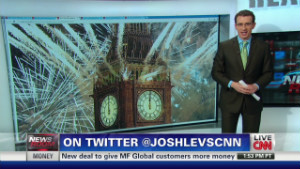 What to expect in 2013
What to expect in 2013 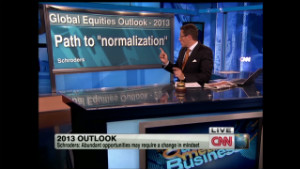 2013's fiscal future
2013's fiscal future "Syria and the Syrian people need, want and look forward to real change. And the meaning of this is clear to all," he said.
The international community still seems as far as ever from meaningful military intervention, even as limited as a no fly-zone. Nor is there any sign of concerted diplomacy to push all sides in Syria toward the sort of deal that ended the war in Bosnia. In those days, the United States and Russia were able to find common ground. In Syria, they have yet to do so, and regional actors such as Turkey, Qatar, Saudi Arabia and Iran also have irons in the fire.
Failing an unlikely breakthrough that would bring the regime and its opponents to a Syrian version of the Dayton Accords that ended the Bosnian war, the greatest risk is that a desperate regime may turn to its chemical weapons, troublesome friends (Hezbollah in Lebanon and the Kurdish PKK in Turkey) and seek to export unrest to Lebanon, Iraq and Jordan.
The Syrian regime has already hinted that it can retaliate against Turkey's support for the rebels -- not by lobbing Scud missiles into Turkey, but by playing the "Kurdish" card. That might involve direct support for the PKK or space for its Syrian ally, the Democratic Union Party. By some estimates, Syrians make up one-third of the PKK's fighting strength.
To the Turkish government, the idea that Syria's Kurds might carve out an autonomous zone and get cozy with Iraq's Kurds is a nightmare in the making. Nearly 800 people have been killed in Turkey since the PKK stepped up its attacks in mid-2011, but with three different sets of elections in Turkey in 2013, a historic bargain between Ankara and the Kurds that make up 18% of Turkey's population looks far from likely.
Many commentators expect Lebanon to become more volatile in 2013 because it duplicates so many of the dynamics at work in Syria. The assassination in October of Lebanese intelligence chief Brig. Gen. Wissam al-Hassan -- as he investigated a pro-Syrian politician accused of obtaining explosives from the Syrian regime -- was an ominous portent.
Victory for the overwhelmingly Sunni rebels in Syria would tilt the fragile sectarian balance next door, threatening confrontation between Lebanon's Sunnis and Hezbollah. The emergence of militant Salafist groups like al-Nusra in Syria is already playing into the hands of militants in Lebanon.
Iraq, too, is not immune from Syria's turmoil. Sunni tribes in Anbar and Ramadi provinces would be heartened should Assad be replaced by their brethren across the border. It would give them leverage in an ever more tense relationship with the Shia-dominated government in Baghdad. The poor health of one of the few conciliators in Iraqi politics, President Jalal Talabani, and renewed disputes between Iraq's Kurds and the government over boundaries in the oil-rich north, augur for a troublesome 2013 in Iraq.
More worries about Iran's nuclear program
Syria's predicament will probably feature throughout 2013, as will the behavior of its only friend in the region: Iran. Intelligence sources say Iran continues to supply the Assad regime with money, weapons and expertise; and military officers who defected from the Syrian army say Iranian technicians work in Syria's chemical weapons program. Al-Assad's continued viability is important for Iran, as his only Arab ally. They also share sponsorship of Hezbollah in Lebanon, which, with its vast supply of rockets and even some ballistic missiles, might be a valuable proxy in the event of an Israeli strike against Iran's nuclear program.
Speaking of which, there are likely to be several more episodes in the behind-closed-doors drama of negotiations on Iran's nuclear sites. Russia is trying to arrange the next round for January. But in public, at least, Iran maintains it has every right to continue enriching uranium for civilian purposes, such as helping in the treatment of more than 1 million Iranians with cancer.
Iran "will not suspend 20% uranium enrichment because of the demands of others," Fereydoun Abbasi-Davani, head of Iran's Atomic Energy Organization, said this month.
International experts say the amount of 20% enriched uranium (estimated by the International Atomic Energy Agency in November at 297 pounds) is more than needed for civilian purposes, and the installation of hundreds more centrifuges could cut the time needed to enrich uranium to weapons-grade. The question is whether Iran will agree to intrusive inspections that would reassure the international community -- and Israel specifically -- that it can't and won't develop a nuclear weapon.
This raises another question: Will it take bilateral U.S.-Iranian talks -- and the prospect of an end to the crippling sanctions regime -- to find a breakthrough? And will Iran's own presidential election in June change the equation?
For now, Israel appears to be prepared to give negotiation (and sanctions) time to bring Iran to the table. For now.
Egypt to deal with new power, economic troubles
Given the turmoil swirling through the Middle East, Israel could probably do without trying to bomb Iran's nuclear program into submission. Besides Syria and Lebanon, it is already grappling with a very different Egypt, where a once-jailed Islamist leader is now president and Salafist/jihadi groups, especially in undergoverned areas like Sinai, have a lease on life unimaginable in the Mubarak era.
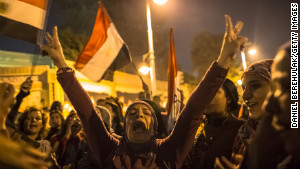
The U.S. has an awkward relationship with President Mohamed Morsy, needing his help in mediating with Hamas in Gaza but concerned that his accumulation of power is fast weakening democracy and by his bouts of anti-Western rhetoric. (He has demanded the release from a U.S. jail of Sheikh Omar Abdel Rahman, convicted of involvement in the first bombing of the World Trade Center in 1993.)
The approval of the constitution removes one uncertainty, even if the opposition National Salvation Front says it cements Islamist power. But as much as the result, the turnout -- about one-third of eligible voters -- indicates that Egyptians are tired of turmoil, and more concerned about a deepening economic crisis.
Morsy imposed and then scrapped new taxes, and the long-expected $4.8 billion loan from the International Monetary Fund is still not agreed on. Egypt's foreign reserves were down to $15 billion by the end of the year, enough to cover less than three months of imports. Tourism revenues are one-third of what they were before street protests erupted early in 2011. Egypt's crisis in 2013 may be more about its economy than its politics.
Libya threatens to spawn more unrest in North Africa
Libya's revolution, if not as seismic as anything Syria may produce, is still reverberating far and wide. As Moammar Gadhafi's rule crumbled, his regime's weapons found their way into an arms bazaar, turning up in Mali and Sinai, even being intercepted off the Lebanese coast.
The Libyan government, such as it is, seems no closer to stamping its authority on the country, with Islamist brigades holding sway in the east, tribal unrest in the Sahara and militias engaged in turf wars. The danger is that Libya, a vast country where civic institutions were stifled for four decades, will become the incubator for a new generation of jihadists, able to spread their influence throughout the Sahel. They will have plenty of room and very little in the way of opposition from security forces.
The emergence of the Islamist group Ansar Dine in Mali is just one example. In this traditionally moderate Muslim country, Ansar's fighters and Tuareg rebels have ejected government forces from an area of northern Mali the size of Spain and begun implementing Sharia law, amputations and floggings included. Foreign fighters have begun arriving to join the latest front in global jihad; and terrorism analysts are seeing signs that al Qaeda in the Islamic Maghreb (AQIM) and groups like Boko Haram in Nigeria are beginning to work together.
There are plans for an international force to help Mali's depleted military take back the north, but one European envoy said it was unlikely to materialize before (wait for it) ... September 2013. Some terrorism analysts see North Africa as becoming the next destination of choice for international jihad, as brigades and camps sprout across a vast area of desert.
A bumpy troop transition for Afghanistan
The U.S. and its allies want to prevent Afghanistan from becoming another haven for terror groups. As the troop drawdown gathers pace, 2013 will be a critical year in standing up Afghan security forces (the numbers are there, their competence unproven), improving civil institutions and working toward a post-Karzai succession.
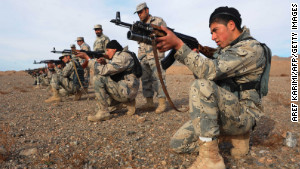
In November, the International Crisis Group said the outlook was far from assuring.
"Demonstrating at least will to ensure clean elections (in Afghanistan in 2014) could forge a degree of national consensus and boost popular confidence, but steps toward a stable transition must begin now to prevent a precipitous slide toward state collapse. Time is running out," the group said.
Critics have also voiced concerns that the publicly announced date of 2014 for withdrawing combat forces only lets the Taliban know how long they must hold out before taking on the Kabul government.
U.S. officials insist the word is "transitioning" rather than "withdrawal," but the shape and role of any military presence in 2014 and beyond are yet to be settled. Let's just say the United States continues to build up and integrate its special operations forces.
The other part of the puzzle is whether the 'good' Taliban can be coaxed into negotiations, and whether Pakistan, which has considerable influence over the Taliban leadership, will play honest broker.
Private meetings in Paris before Christmas that involved Taliban envoys and Afghan officials ended with positive vibes, with the Taliban suggesting they were open to working with other political groups and would not resist girls' education. There was also renewed discussion about opening a Taliban office in Qatar, but we've been here before. The Taliban are riven by internal dissent and may be talking the talk while allowing facts on the ground to work to their advantage.
Where will North Korea turn its focus?
On the subject of nuclear states that the U.S.-wishes-were-not, the succession in North Korea has provided no sign that the regime is ready to restrain its ambitious program to test nuclear devices and the means to deliver them.
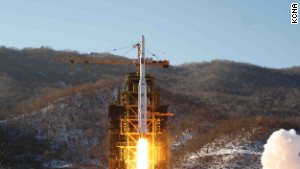
Back in May 2012, Peter Brookes of the American Foreign Policy Council said that "North Korea is a wild card -- and a dangerous one at that." He predicted that the inexperienced Kim Jong Un would want to appear "large and in charge," for internal and external consumption. In December, Pyongyang launched a long-range ballistic missile -- one that South Korean scientists later said had the range to reach the U.S. West Coast. Unlike the failure of the previous missile launch in 2009, it managed to put a satellite into orbit.
The last two such launches have been followed by nuclear weapons tests -- in 2006 and 2009. Recent satellite images of the weapons test site analyzed by the group 38 North show continued activity there.
So the decision becomes a political one. Does Kim continue to appear "large and in charge" by ordering another test? Or have the extensive reshuffles and demotions of the past year already consolidated his position, allowing him to focus on the country's dire economic situation?
China-Japan island dispute to simmer
It's been a while since East Asia has thrown up multiple security challenges, but suddenly North Korea's missile and nuclear programs are not the only concern in the region. There's growing rancor between China and Japan over disputed islands in the East China Sea, which may be aggravated by the return to power in Japan of Shinzo Abe as prime minister.
Abe has long been concerned that Japan is vulnerable to China's growing power and its willingness to project that power. Throughout 2012, Japan and China were locked in a war of words over the Senkaku or Diaoyu islands, with fishing and Coast Guard boats deployed to support claims of sovereignty.
In the days before Japanese went to the polls, Beijing also sent a surveillance plane over the area, marking the first time since 1958, according to Japanese officials, that Bejing had intruded into "Japanese airspace." Japan scrambled F-15 jets in response.
The islands are uninhabited, but the seas around them may be rich in oil and gas. There is also a Falklands factor at play here. Not giving in to the other side is a matter of national pride. There's plenty of history between China and Japan -- not much of it good.
As China has built up its ability to project military power, Japan's navy has also expanded. Even a low-level incident could lead to an escalation. And as the islands are currently administered by Japan, the U.S. would have an obligation to help the Japanese defend them.
Few analysts expect conflict to erupt, and both sides have plenty to lose. For Japan, China is a critical market, but Japanese investment there has fallen sharply in the past year. Just one in a raft of problems for Abe. His prescription for dragging Japan out of its fourth recession since 2000 is a vast stimulus program to fund construction and other public works and a looser monetary policy.
The trouble is that Japan's debt is already about 240% of its GDP, a much higher ratio than even Greece. And Japan's banks hold a huge amount of that debt. Add a shrinking and aging population, and at some point the markets might decide that the yield on Japan's 10-year sovereign bond ought to be higher than the current 0.77%.
Economic uncertainty in U.S., growth in China
So the world's third-largest economy may not help much in reviving global growth, which in 2012 was an anemic 2.2%, according to United Nations data. The parts of Europe not mired in recession hover close to it, and growth in India and Brazil has weakened. Which leaves the U.S. and China.
At the time of writing, the White House and congressional leadership are still peering over the fiscal cliff. Should they lose their footing, the Congressional Budget Office expects the arbitrary spending cuts and tax increases to be triggered will push the economy into recession and send unemployment above 9%.
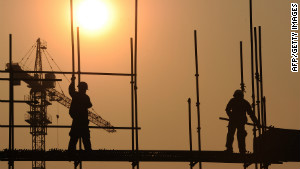
A stopgap measure, rather than a long-term foundation for reducing the federal deficit, looks politically more likely. But to companies looking for predictable economic policy, it may not be enough to unlock billions in investment. Why spend heavily if there's a recession around the corner, or if another fight looms over raising the federal debt ceiling?
In September, Moody's said it would downgrade the U.S. sovereign rating from its "AAA" rating without "specific policies that produce a stabilization and then downward trend in the ratio of federal debt to GDP over the medium term." In other words, it wants action beyond kicking the proverbial can.
Should the cliff be dodged, most forecasts see the U.S. economy expanding by about 2% in 2013. That's not enough to make up for stagnation elsewhere, so a great deal depends on China avoiding the proverbial hard landing.
Until now, Chinese growth has been powered by exports and infrastructure spending, but there are signs that China's maturing middle class is also becoming an economic force to be reckoned with. Consultants PwC expect retail sales in China to increase by 10.5% next year -- with China overtaking the U.S. as the world's largest retail market by 2016.
Europe's economic outlook a little better
No one expects Europe to become an economic powerhouse in 2013, but at least the horizon looks a little less dark than it did a year ago. The "PIGS' " (Portugal, Ireland/Italy, Greece, Spain) borrowing costs have eased; there is at least rhetorical progress toward a new economic and fiscal union; and the European Central Bank has talked tough on defending the Eurozone.
Mario Draghi, president of the European Central Bank, fended off the dragons with the declaration in July that "Within our mandate, the ECB is ready to do whatever it takes to preserve the euro. And believe me, it will be enough."
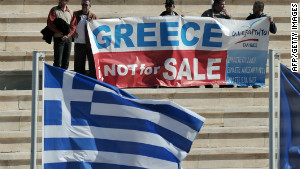
Draghi has promised the bank has unlimited liquidity to buy sovereign debt, as long as governments (most likely Spain) submit to reforms designed to balance their budgets. But in 2013, the markets will want more than brave talk, including real progress toward banking and fiscal union that will leave behind what Draghi likes to call Europe's "fairy world" of unsustainable debt and collapsing banks. Nothing can be done without the say-so of German Chancellor Angela Merkel, renowned for a step-by-step approach that's likely to be even more cautious in a year when she faces re-election.
Elections in Italy in February may be more important -- pitching technocrat Prime Minister Mario Monti against the maverick he replaced, 76-year old Silvio Berlusconi. After the collapse of Berlusconi's coalition 13 months ago, Monti reined in spending, raised the retirement age and raised taxes to bring Italy back from the brink of insolvency. Now he will lead a coalition of centrist parties into the election. But polls suggest that Italians are tired of Monti's austerity program, and Berlusconi plans a populist campaign against the man he calls "Germano-centric."
The other tripwire in Europe may be Greece. More cuts in spending -- required to qualify for an EU/IMF bailout -- are likely to deepen an already savage recession, threatening more social unrest and the future of a fragile coalition. A 'Grexit' from the eurozone is still possible, and that's according to the Greek finance minister, Yannis Stournaras.
Expect to see more evidence of climate change
Hurricane Sandy, which struck the U.S. East Coast in November, was the latest indicator of changing and more severe weather patterns. Even if not repeated in 2013, extreme weather is beginning to have an effect -- on where people live, on politicians and on the insurance industry.
After Sandy, New York Gov. Andrew Cuomo said that after "the last few years, I don't think anyone can sit back anymore and say, 'Well, I'm shocked at that weather pattern.' " The storm of the century has become the storm of every decade or so, said Michael Oppenheimer, professor of geosciences at Princeton.
"Climate change will probably increase storm intensity and size simultaneously, resulting in a significant intensification of storm surges," he and colleagues wrote in Nature.
In the U.S., government exposure to storm-related losses in coastal states has risen more than 15-fold since 1990, to $885 billion in 2011, according to the Insurance Information Institute. The Munich RE insurance group says North America has seen higher losses from extreme weather than any other part of the world in recent decades.
"A main loss driver is the concentration of people and assets on the coast combined with high and possibly growing vulnerabilities," it says.
Risk Management Solutions, which models catastrophic risks, recently updated its scenarios, anticipating an increase of 40% in insurance losses on the Gulf Coast, Florida and the Southeast over the next five years, and 25% to 30% for the mid-Atlantic and Northeastern states. Those calculations were done before Sandy.
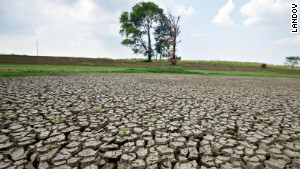
Inland, eyes will be trained on the heavens for signs of rain -- after the worst drought in 50 years across the Midwest. Climatologists say that extended periods of drought -- from the U.S. Midwest to Ukraine -- may be "the new normal." Jennifer Francis at the Institute of Marine and Coastal Sciences at Rutgers University has shown that a warmer Arctic tends to slow the jet stream, causing it to meander and, in turn, prolong weather patterns. It's called Arctic amplification, and it is probably aggravating drought in the Northwest United States and leading to warmer summers in the Northern Hemisphere, where 2012 was the hottest year on record.
It is a double-edged sword: Warmer temperatures may make it possible to begin cultivating in places like Siberia, but drier weather in traditional breadbaskets would be very disruptive. The U.N. Food and Agriculture Organization reports that stocks of key cereals have tightened, contributing to volatile world markets. Poor weather in Argentina, the world's second-largest exporter of corn, may compound the problem.
More cyber warfare
What will be the 2013 equivalents of Flame, Gauss and Shamoon? They were some of the most damaging computer viruses of 2012. The size and versatility of Flame was unlike nothing seen before, according to anti-virus firm Kaspersky Lab.

Gauss stole online banking information in the Middle East. Then came Shamoon, a virus that wiped the hard drives of about 30,000 computers at the Saudi oil company Aramco, making them useless. The Saudi government declared it an attack on the country's economy; debate continues on whether it was state-sponsored.
Kaspersky predicts that in 2013, we will see "new examples of cyber-warfare operations, increasing targeted attacks on businesses and new, sophisticated mobile threats."
Computer security firm McAfee also expects more malware to be developed to attack mobile devices and apps in 2013.
U.S. Defense Secretary Leon Panetta is more concerned about highly sophisticated attacks on infrastructure that "could be as destructive as the terrorist attack on 9/11."
"We know that foreign cyber actors are probing America's critical infrastructure networks. They are targeting the computer control systems that operate chemical, electricity and water plants and those that guide transportation throughout this country," he said in October.
Intellectual property can be stolen, bought or demanded as a quid pro quo for market access. The U.S. intelligence community believes China or Chinese interests are employing all three methods in an effort to close the technology gap.
In the waning days of 2012, the interagency Committee on Foreign Investment in the United States said "there is likely a coordinated strategy among one or more foreign governments or companies to acquire U.S. companies involved in research, development, or production of critical technologies."
It did not name the country in its unclassified report but separately noted a growing number of attempts by Chinese entities to buy U.S. companies.
Who will be soccer's next 'perfect machine'?

There's room for two less serious challenges in 2013. One is whether any football team, in Spain or beyond, can beat Barcelona and its inspirational goal machine Lionel Messi, who demolished a record that had stood since 1972 for the number of goals scored in a calendar year. (Before Glasgow Celtic fans start complaining, let's acknowledge their famous win against the Spanish champions in November.)
Despite the ill health of club coach Tito Vilanova, "Barca" sits imperiously at the top of La Liga in Spain and is the favorite to win the world's most prestigious club trophy, the European Champions League, in 2013. AC Milan is its next opponent in a match-up that pits two of Europe's most storied clubs against each other. But as Milan sporting director Umberto Gandini acknowledges, "We face a perfect machine."
Will Gangnam give it up to something sillier?

Finally, can something -- anything -- displace Gangnam Style as the most watched video in YouTube's short history? As of 2:16 p.m. ET on December 26, it had garnered 1,054,969,395 views and an even more alarming 6,351,871 "likes."
Perhaps in 2013 the YouTube audience will be entranced by squirrels playing table tennis, an octopus that spins plates or Cistercian nuns dancing the Macarena. Or maybe Gangnam will get to 2 billion with a duet with Justin Bieber.
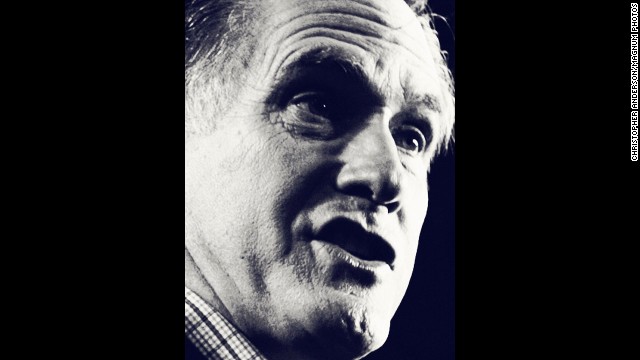 January 7: This portrait of Mitt Romney was made in New Hampshire shortly before its primary and appeared as part of an instantly classic photo essay by photographer Christopher Anderson for New York magazine.
January 7: This portrait of Mitt Romney was made in New Hampshire shortly before its primary and appeared as part of an instantly classic photo essay by photographer Christopher Anderson for New York magazine.  January 9: Members of the Alabama Crimson Tide hold the BCS trophy after defeating the LSU Tigers to win the National Championship college football title in New Orleans.
January 9: Members of the Alabama Crimson Tide hold the BCS trophy after defeating the LSU Tigers to win the National Championship college football title in New Orleans. 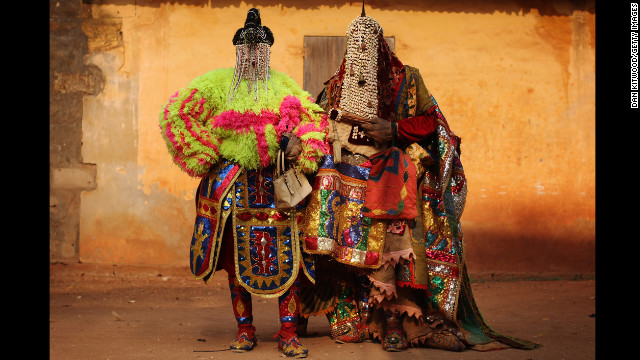 January 10: "Voodoo spirits" walk the streets in Ouidah, Benin, for the annual Voodoo festival. Ouidah is the Voodoo heartland in this West African nation and thought to be the spiritual birthplace of Voodoo.
January 10: "Voodoo spirits" walk the streets in Ouidah, Benin, for the annual Voodoo festival. Ouidah is the Voodoo heartland in this West African nation and thought to be the spiritual birthplace of Voodoo. 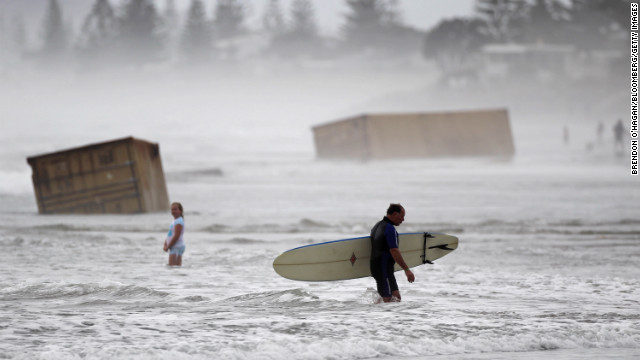 January 10: A surfer walks past cargo containers washed ashore from the stricken container ship Rena at Waihi Beach in New Zealand. The ship was stranded on a reef for more than three months before breaking up and sinking in rough seas, littering beaches with cargo and debris.
January 10: A surfer walks past cargo containers washed ashore from the stricken container ship Rena at Waihi Beach in New Zealand. The ship was stranded on a reef for more than three months before breaking up and sinking in rough seas, littering beaches with cargo and debris. 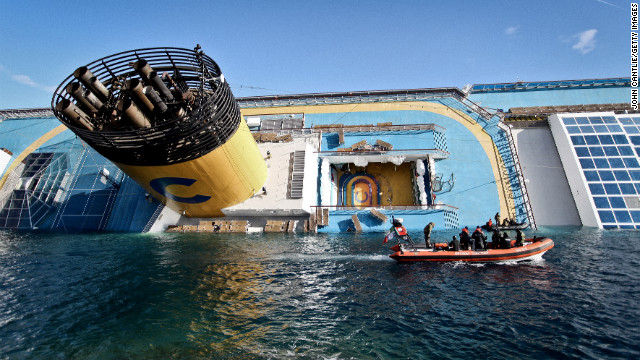 January 15: The cruise ship Costa Concordia lies stricken off the shore of the Italian island of Giglio. The ship struck a rock and turned on its side on January 13, killing 32 people from eight countries.
January 15: The cruise ship Costa Concordia lies stricken off the shore of the Italian island of Giglio. The ship struck a rock and turned on its side on January 13, killing 32 people from eight countries. 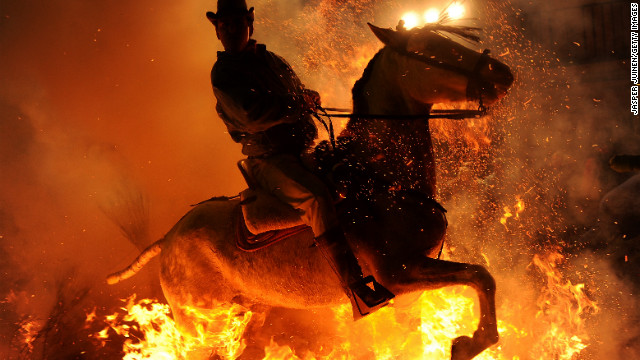 January 16: A man rides a horse through a bonfire in the small village of San Bartolome de Pinares, Spain, in honor of San Anton, the patron saint of animals.
January 16: A man rides a horse through a bonfire in the small village of San Bartolome de Pinares, Spain, in honor of San Anton, the patron saint of animals. 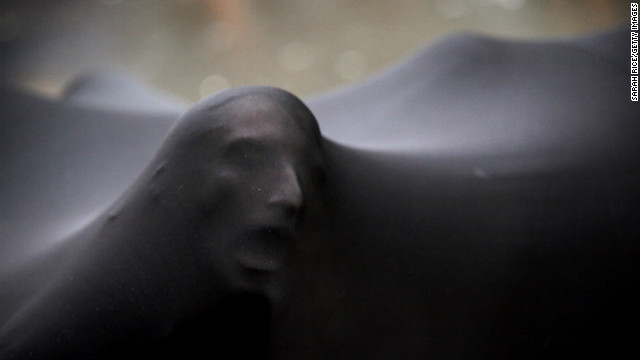 January 20: The amorphous black blob, a group of performers huddled underneath stretched black material, makes its way among the Occupy Wall Street West protests in San Franscico's Financial District. The Occupy movement marked its one-year anniversary on September 17.
January 20: The amorphous black blob, a group of performers huddled underneath stretched black material, makes its way among the Occupy Wall Street West protests in San Franscico's Financial District. The Occupy movement marked its one-year anniversary on September 17. 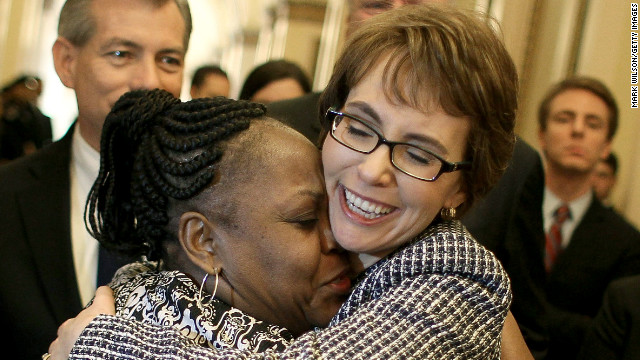 January 25: Former U.S. Rep. Gabrielle Giffords hugs House Cloak Room attendant Ella Terry after resigning from Congress. Giffords stepped down to focus on her recovery from a gunshot wound to the head she received last year in Tucson, Arizona. On August 7, Jared Lee Loughner plead guilty to 19 charges in the 2011 shooting that killed six people and wounded Giffords, among others.
January 25: Former U.S. Rep. Gabrielle Giffords hugs House Cloak Room attendant Ella Terry after resigning from Congress. Giffords stepped down to focus on her recovery from a gunshot wound to the head she received last year in Tucson, Arizona. On August 7, Jared Lee Loughner plead guilty to 19 charges in the 2011 shooting that killed six people and wounded Giffords, among others. 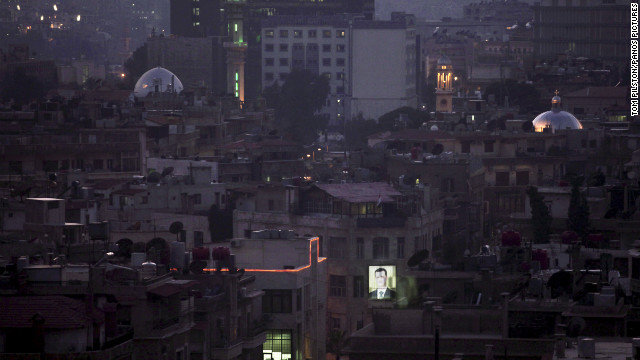 January 26: An illuminated portrait of Syrian President Bashar al-Assad shines out as dusk settles over Damascus. About 40,000 civilians have been killed since the first protests began in March 2011 against al-Assad's government, according to the opposition Center for Documentation of Violations in Syria.
January 26: An illuminated portrait of Syrian President Bashar al-Assad shines out as dusk settles over Damascus. About 40,000 civilians have been killed since the first protests began in March 2011 against al-Assad's government, according to the opposition Center for Documentation of Violations in Syria. 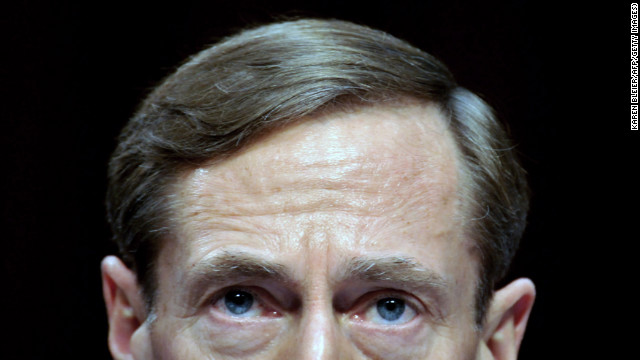 January 31: CIA director David Petraeus testifies before the Senate Intelligence Committee during a committee hearing on worldwide threats. On November 9, Petraeus submitted his resignation to President Obama, citing personal reasons. He admitted to having an extramarital affair with his biographer Paula Broadwell.
January 31: CIA director David Petraeus testifies before the Senate Intelligence Committee during a committee hearing on worldwide threats. On November 9, Petraeus submitted his resignation to President Obama, citing personal reasons. He admitted to having an extramarital affair with his biographer Paula Broadwell.  February 5: Football fans watch the New York Giants take on the New England Patriots in Super Bowl XLVI at Tonic Bar in New York. The Giants defeated the Patriots 21-17.
February 5: Football fans watch the New York Giants take on the New England Patriots in Super Bowl XLVI at Tonic Bar in New York. The Giants defeated the Patriots 21-17. 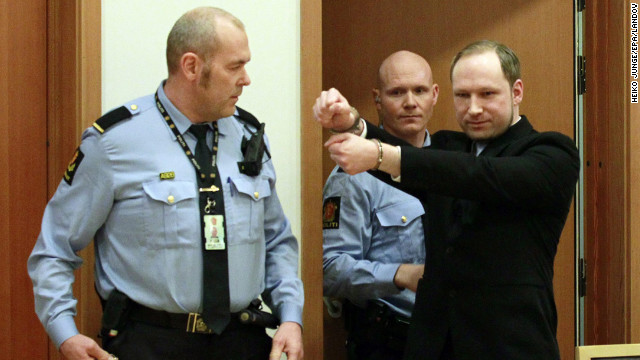 February 6: Anders Behring Breivik arrives for his court hearing in Oslo, Norway. He was sentenced to 21 years in prison on August 24 for killing 77 people in two terror attacks in Norway in 2011. Eight people died in a bombing in Oslo, while 69 young people were shot to death on nearby Utoya island.
February 6: Anders Behring Breivik arrives for his court hearing in Oslo, Norway. He was sentenced to 21 years in prison on August 24 for killing 77 people in two terror attacks in Norway in 2011. Eight people died in a bombing in Oslo, while 69 young people were shot to death on nearby Utoya island. 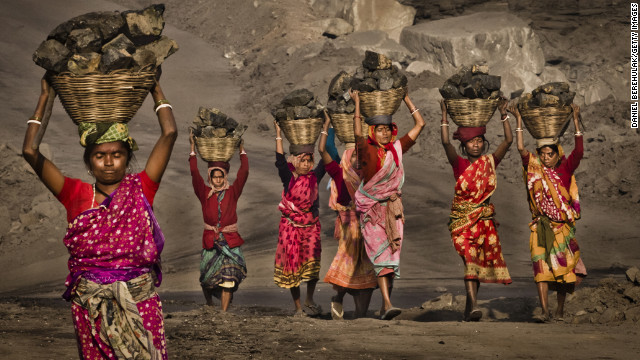 February 11: Villagers carry coal scavenged illegally from an open-cast coal mine in the village of Jina Gora, India. Claiming that a decades-old underground coal fire threatened the homes of villagers, the government relocated more than 2,300 families.
February 11: Villagers carry coal scavenged illegally from an open-cast coal mine in the village of Jina Gora, India. Claiming that a decades-old underground coal fire threatened the homes of villagers, the government relocated more than 2,300 families.  February 13: Judges inspect a beagle during the 136th Westminster Kennel Club Dog Show at Madison Square Garden in New York. About 2,500 dogs competed.
February 13: Judges inspect a beagle during the 136th Westminster Kennel Club Dog Show at Madison Square Garden in New York. About 2,500 dogs competed. 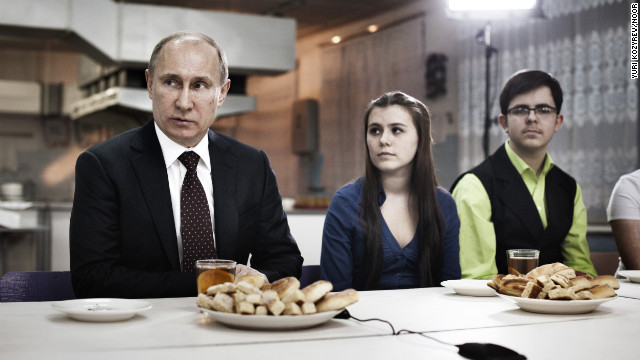 February 13: Prime Minister Vladimir Putin meets with a group of parents, teachers and students in Kurgan, a factory town at the southern end of the Ural Mountains. Putin won a third term as Russia's president on March 4.
February 13: Prime Minister Vladimir Putin meets with a group of parents, teachers and students in Kurgan, a factory town at the southern end of the Ural Mountains. Putin won a third term as Russia's president on March 4. 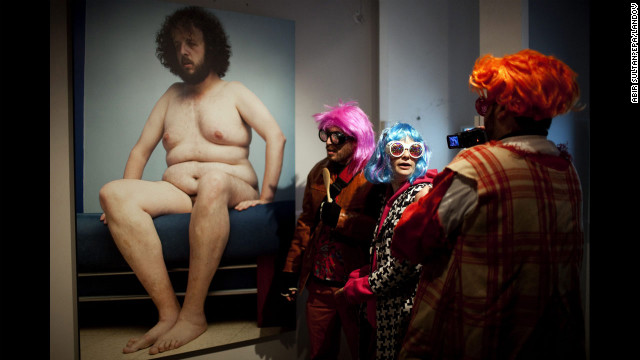 February 20: Israeli students wearing costumes visit an art exhibition in downtown Jerusalem. The special cultural project aimed to draw people out in spite of the cold weather to enjoy art in a party atmosphere.
February 20: Israeli students wearing costumes visit an art exhibition in downtown Jerusalem. The special cultural project aimed to draw people out in spite of the cold weather to enjoy art in a party atmosphere. 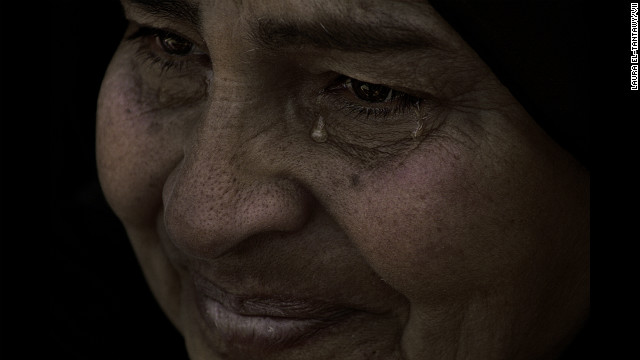 February 22: Safeya Sayed Shedeed cries in Cairo while following the trial for former president Hosni Mubarak, who was tried on charges of corruption and giving orders to kill protesters. Her son was shot and killed by police officers on January 28, 2011, a day locals dubbed the "Friday of Rage." Mubarak was sentenced to life in prison in June.
February 22: Safeya Sayed Shedeed cries in Cairo while following the trial for former president Hosni Mubarak, who was tried on charges of corruption and giving orders to kill protesters. Her son was shot and killed by police officers on January 28, 2011, a day locals dubbed the "Friday of Rage." Mubarak was sentenced to life in prison in June. 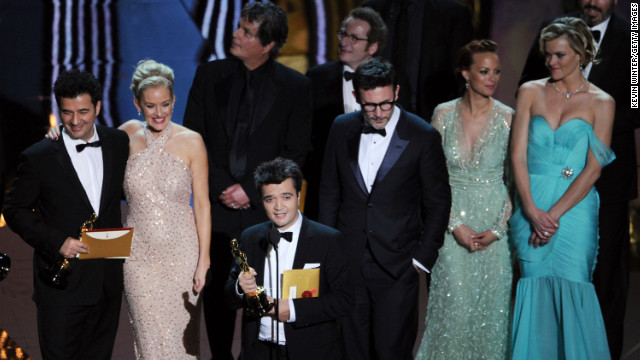 February 26: Surrounded by the cast and crew, producer Thomas Langmann accepts the best picture award for "The Artist" during the 84th Annual Academy Awards in Hollywood. The silent, black-and-white film garnered five Oscars.
February 26: Surrounded by the cast and crew, producer Thomas Langmann accepts the best picture award for "The Artist" during the 84th Annual Academy Awards in Hollywood. The silent, black-and-white film garnered five Oscars. 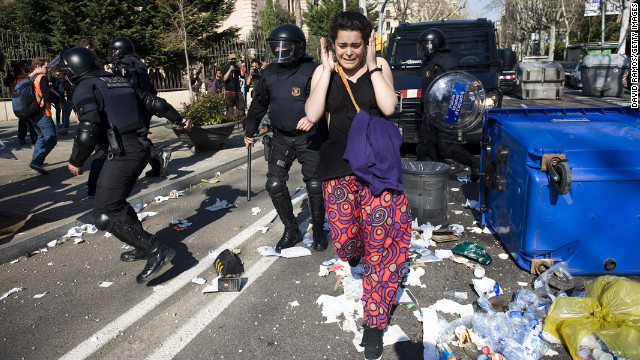 February 29: A protester runs for cover as riot police clash with students during a demonstration in Barcelona, Spain. Tens of thousands of students protested education cuts announced by the Catalan government.
February 29: A protester runs for cover as riot police clash with students during a demonstration in Barcelona, Spain. Tens of thousands of students protested education cuts announced by the Catalan government. 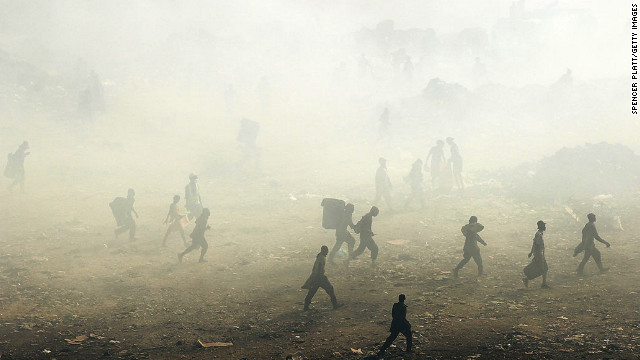 March 7: Children and adults scavenge for recyclables and other usable items at the Trutier dump on the outskirts of Port-au-Prince, Haiti. Following the devastating 2010 earthquake that killed more than 220,000 people, the number of daily scavengers at the landfill grew from about 200 to an estimated 2,000. Much of the country is still in crisis.
March 7: Children and adults scavenge for recyclables and other usable items at the Trutier dump on the outskirts of Port-au-Prince, Haiti. Following the devastating 2010 earthquake that killed more than 220,000 people, the number of daily scavengers at the landfill grew from about 200 to an estimated 2,000. Much of the country is still in crisis. 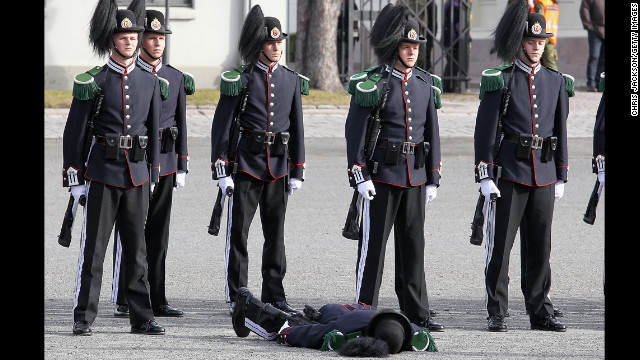 March 20: A soldier faints as Camilla, Duchess of Cornwall, and Prince Charles, Prince of Wales, arrive for a wreath-laying ceremony at the National Monument at Akershus Fortress in Olso, Norway. The royals were on a Diamond Jubilee tour of Scandinavia.
March 20: A soldier faints as Camilla, Duchess of Cornwall, and Prince Charles, Prince of Wales, arrive for a wreath-laying ceremony at the National Monument at Akershus Fortress in Olso, Norway. The royals were on a Diamond Jubilee tour of Scandinavia. 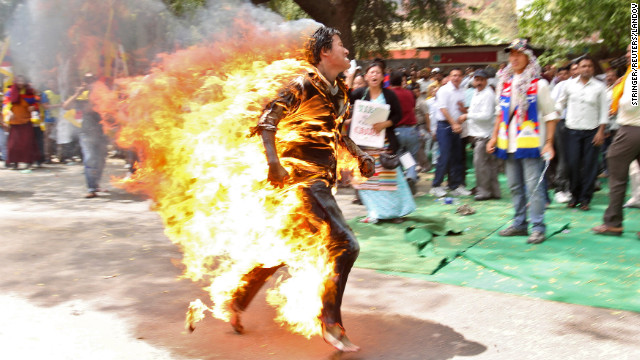 March 26: A Tibetan exile runs after setting himself on fire in New Delhi, India, during a protest against Chinese President Hu Jintao's upcoming visit.
March 26: A Tibetan exile runs after setting himself on fire in New Delhi, India, during a protest against Chinese President Hu Jintao's upcoming visit.  March 28: Sgt. 1st Class Paul Brady of the 182nd Infantry Massachusetts National Guard embraces his 6-year-old daughter, Regan, during a welcome home ceremony in Melrose, Massachusetts. The 182nd Infantry Regiment, one of the original units in the United States military, returned from a yearlong deployment in Afganistan.
March 28: Sgt. 1st Class Paul Brady of the 182nd Infantry Massachusetts National Guard embraces his 6-year-old daughter, Regan, during a welcome home ceremony in Melrose, Massachusetts. The 182nd Infantry Regiment, one of the original units in the United States military, returned from a yearlong deployment in Afganistan. 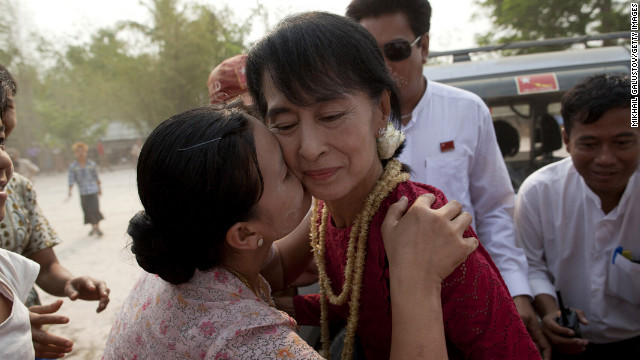 April 1: A supporter kisses Aung San Suu Kyi, leader of the National League for Democracy, as she visits polling stations in her constituency as Burmese vote in parliamentary elections in Kawhmu, Myanmar. She won a seat in parliament in Myanmar's first multiparty elections since 1990.
April 1: A supporter kisses Aung San Suu Kyi, leader of the National League for Democracy, as she visits polling stations in her constituency as Burmese vote in parliamentary elections in Kawhmu, Myanmar. She won a seat in parliament in Myanmar's first multiparty elections since 1990. 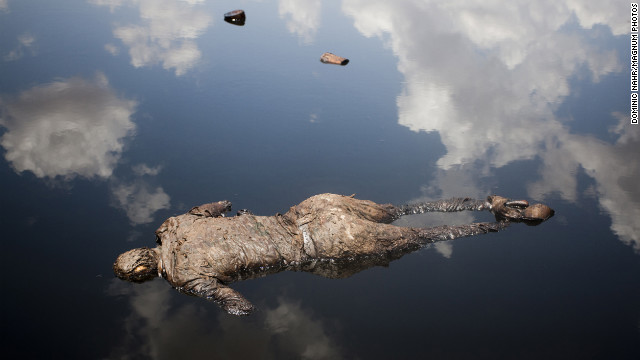 April 17: A Sudan Armed Forces soldier lies dead in a pool of oil next to a leaking oil facility. He had engaged in heavy fighting with Sudan People's Liberation Army troops from South Sudan.
April 17: A Sudan Armed Forces soldier lies dead in a pool of oil next to a leaking oil facility. He had engaged in heavy fighting with Sudan People's Liberation Army troops from South Sudan. 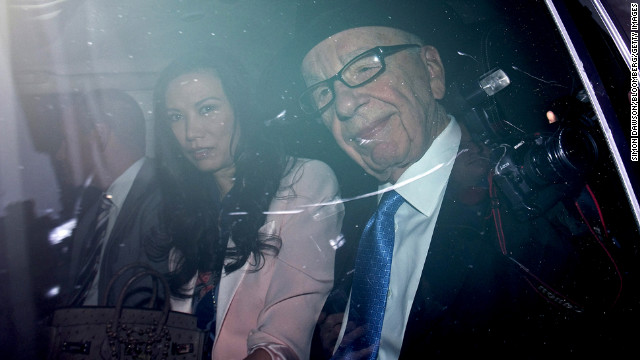 April 26: Rupert Murdoch, chief executive officer of News Corp., and his wife, Wendi, are driven from their London apartment. Testifying before an independent British inquiry into journalistic ethics, Murdoch admitted to a cover-up of abuses at the News of the World tabloid and apologized for not paying more attention to the phone-hacking scandal.
April 26: Rupert Murdoch, chief executive officer of News Corp., and his wife, Wendi, are driven from their London apartment. Testifying before an independent British inquiry into journalistic ethics, Murdoch admitted to a cover-up of abuses at the News of the World tabloid and apologized for not paying more attention to the phone-hacking scandal. 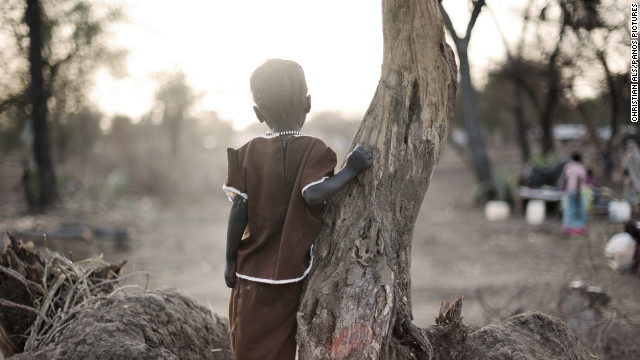 May 7: A young girl looks over the Doro refugee camp in South Sudan in May. More than 500,000 people have fled from Sudan into South Sudan as a result of the ongoing conflict between the two states.
May 7: A young girl looks over the Doro refugee camp in South Sudan in May. More than 500,000 people have fled from Sudan into South Sudan as a result of the ongoing conflict between the two states. 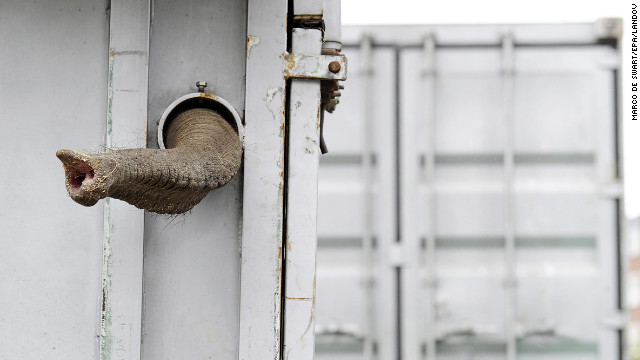 May 8: Tonya sticks her trunk out of a container during her removal from the Zoo Blijdorp in Rotterdam, The Netherlands. She had to leave the zoo with her mother, Douanita, because she did not get along with the other elephants. They were moved to a zoo in Prague, Czech Republic.
May 8: Tonya sticks her trunk out of a container during her removal from the Zoo Blijdorp in Rotterdam, The Netherlands. She had to leave the zoo with her mother, Douanita, because she did not get along with the other elephants. They were moved to a zoo in Prague, Czech Republic. 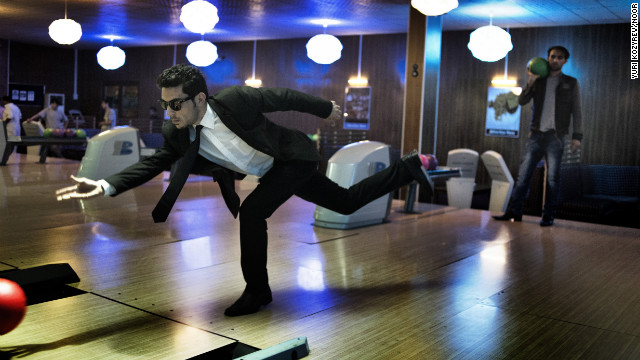 May 15: Young Afghans bowl in Kabul at the Strikers, Afghanistan's only bowling alley. It has gained popularity since opening in the fall of 2011.
May 15: Young Afghans bowl in Kabul at the Strikers, Afghanistan's only bowling alley. It has gained popularity since opening in the fall of 2011. 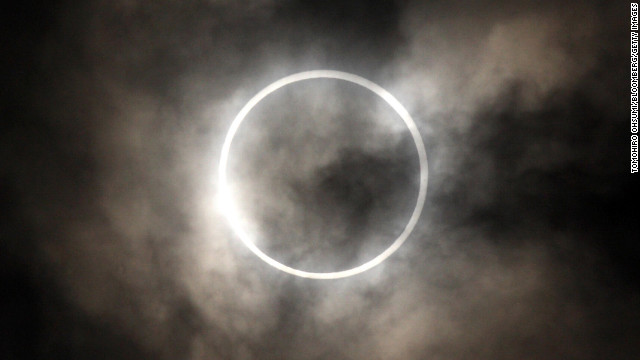 May 21: The sun is obscured by the moon during an annular solar eclipse in Tokyo.
May 21: The sun is obscured by the moon during an annular solar eclipse in Tokyo. 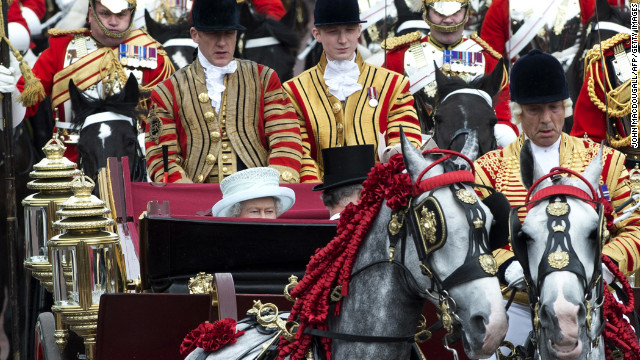 June 5: Britain's Queen Elizabeth II waves from her seat in the 1902 State Landau coach during the carriage procession from Westminster Hall to Buckingham Palace to celebrate the Queen's Diamond Jubilee.
June 5: Britain's Queen Elizabeth II waves from her seat in the 1902 State Landau coach during the carriage procession from Westminster Hall to Buckingham Palace to celebrate the Queen's Diamond Jubilee. 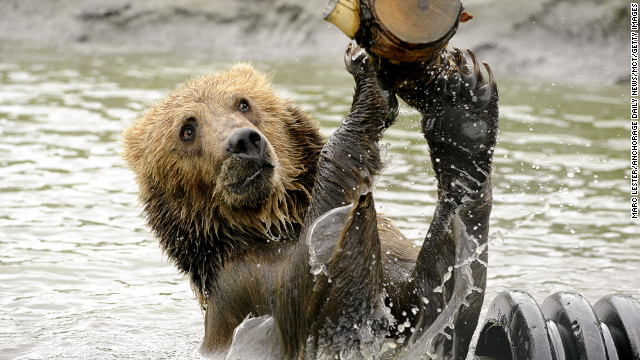 June 13: Taquoka plays with a log in a pond in his enclosure at the Alaska Wildlife Conservation Center in Portage, Alaska. The 2-year-old male brown bear began a trip to his new home in Sweden.
June 13: Taquoka plays with a log in a pond in his enclosure at the Alaska Wildlife Conservation Center in Portage, Alaska. The 2-year-old male brown bear began a trip to his new home in Sweden. 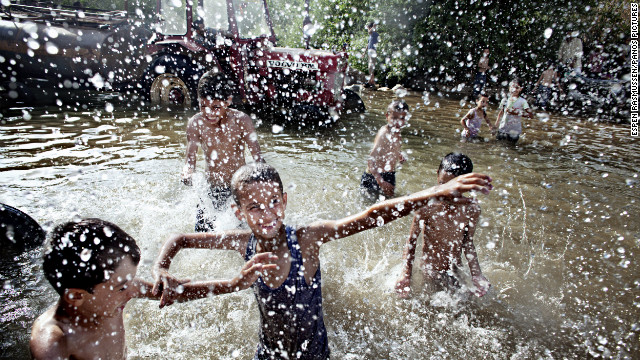 June 15: Lebanese children and Syrian refugees play in a natural spring close to the Syrian border. Behind them, a line of trucks and tractors collect fresh water to supply villages in the area. Tens of thousands of people have fled from Syria to Lebanon since the conflict started.
June 15: Lebanese children and Syrian refugees play in a natural spring close to the Syrian border. Behind them, a line of trucks and tractors collect fresh water to supply villages in the area. Tens of thousands of people have fled from Syria to Lebanon since the conflict started. 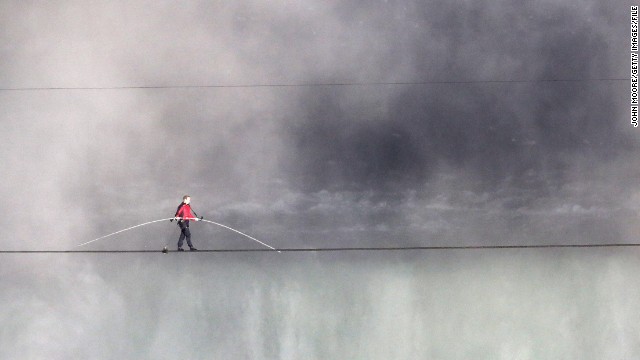 June 15: Aerialist Nik Wallenda walks the tighrope over Niagara Falls in Canada. Wallenda walked across the 1,800-feet-long, 2-inch-wide wire as the first person to cross directly over the falls from the United States into Canada.
June 15: Aerialist Nik Wallenda walks the tighrope over Niagara Falls in Canada. Wallenda walked across the 1,800-feet-long, 2-inch-wide wire as the first person to cross directly over the falls from the United States into Canada. 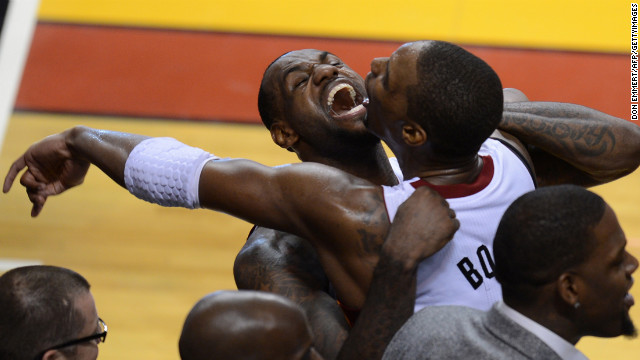 June 21: LeBron James of the Miami Heat celebrates with teammate Chris Bosh during the NBA Finals game between the Miami Heat and the Oklahoma City Thunder in Miami. The Heat won the series 4-1.
June 21: LeBron James of the Miami Heat celebrates with teammate Chris Bosh during the NBA Finals game between the Miami Heat and the Oklahoma City Thunder in Miami. The Heat won the series 4-1. 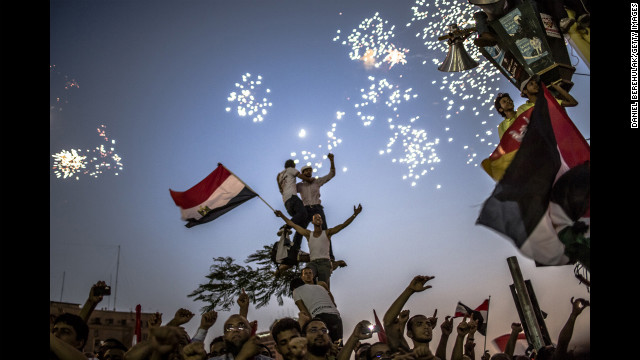 June 24: Egyptians celebrate the election of President Mohamed Morsy in Tahrir Square in Cairo. He was sworn in on June 30 as the country's first democratically elected president.
June 24: Egyptians celebrate the election of President Mohamed Morsy in Tahrir Square in Cairo. He was sworn in on June 30 as the country's first democratically elected president. 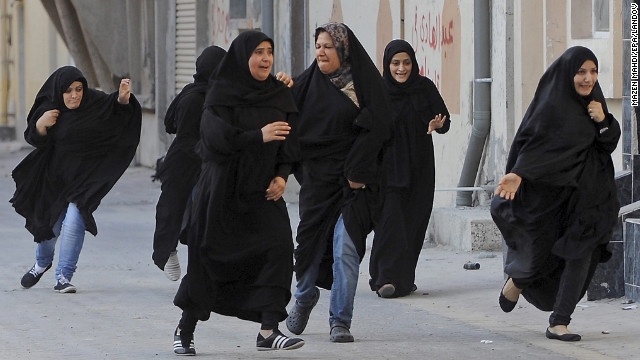 June 27: Protesters run for cover as police arrive to disperse a rally demanding human rights reforms in the village of Buri, south of Bahrain's capital, Manama. A court in Bahrain sentenced prominent activist Nabeel Rajab to three years in prison in August "for participating in illegal rallies and gatherings."
June 27: Protesters run for cover as police arrive to disperse a rally demanding human rights reforms in the village of Buri, south of Bahrain's capital, Manama. A court in Bahrain sentenced prominent activist Nabeel Rajab to three years in prison in August "for participating in illegal rallies and gatherings." 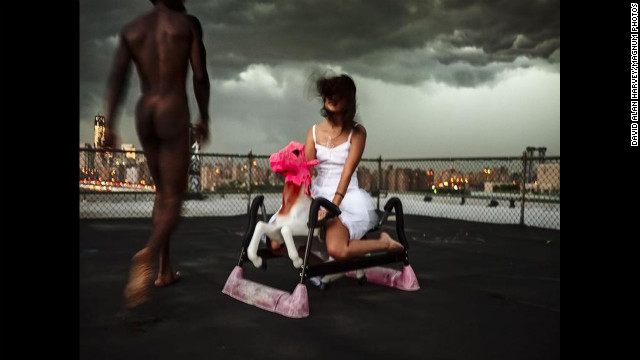 Sometime in July: Magnum photographer David Alan Harvey's assistant sits on a rocking horse at his apartment on the water in Brooklyn, New York, for this fine-art photograph, "White Horse No. 2."
Sometime in July: Magnum photographer David Alan Harvey's assistant sits on a rocking horse at his apartment on the water in Brooklyn, New York, for this fine-art photograph, "White Horse No. 2." 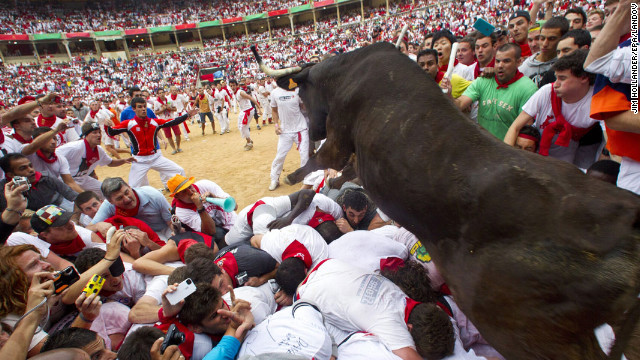 July 8: A wild bull hurdles over people blocking the animal's way into the bullring at the close of the second bull run during the Fiesta de San Fermin in Pamplona, Spain. The festival attracts thousands of people who attempt to outrun the bulls through the narrow streets of the old city.
July 8: A wild bull hurdles over people blocking the animal's way into the bullring at the close of the second bull run during the Fiesta de San Fermin in Pamplona, Spain. The festival attracts thousands of people who attempt to outrun the bulls through the narrow streets of the old city. 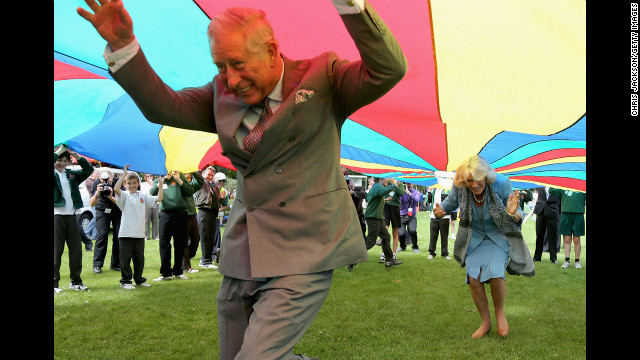 July 19: Prince Charles, Prince of Wales, and Camilla, Duchess of Cornwall, take part in a parachute game during a visit to Saumarez Park in St Peter Port, United Kingdom. They were taking part in a Diamond Jubilee visit to the Channel Islands.
July 19: Prince Charles, Prince of Wales, and Camilla, Duchess of Cornwall, take part in a parachute game during a visit to Saumarez Park in St Peter Port, United Kingdom. They were taking part in a Diamond Jubilee visit to the Channel Islands. 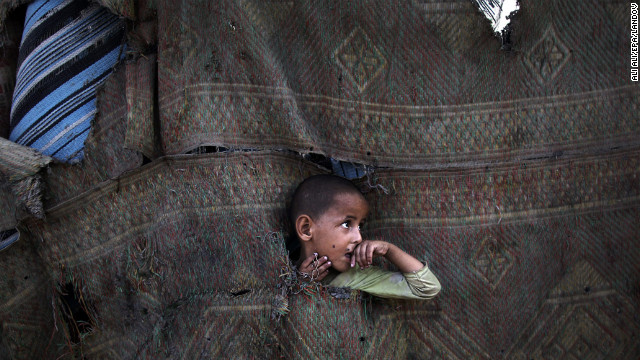 July 22: A Palestinian refugee plays in between makeshift tents in the Al-Zaiton neighborhood before breaking fast on the third day of the holy month of Ramadan in Gaza. During Ramadan, Muslims fast from dawn to dusk.
July 22: A Palestinian refugee plays in between makeshift tents in the Al-Zaiton neighborhood before breaking fast on the third day of the holy month of Ramadan in Gaza. During Ramadan, Muslims fast from dawn to dusk. 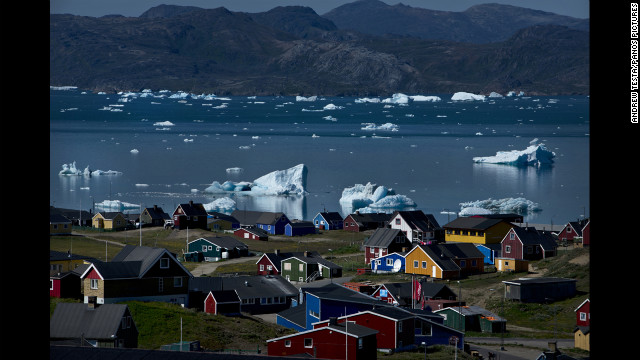 July 23: Icebergs from nearby glaciers float in the bay in Narsaq, Greenland.
July 23: Icebergs from nearby glaciers float in the bay in Narsaq, Greenland. 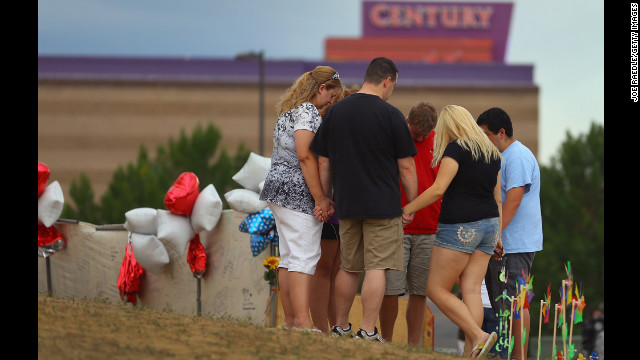 July 28: Visitors gather and pray around a cross erected at a memorial set up across the street from the Century 16 movie theater in Aurora, Colorado. James Holmes is suspected of killing 12 people and injuring 58 others during a shooting rampage on July 20 at a screening of "The Dark Knight Rises."
July 28: Visitors gather and pray around a cross erected at a memorial set up across the street from the Century 16 movie theater in Aurora, Colorado. James Holmes is suspected of killing 12 people and injuring 58 others during a shooting rampage on July 20 at a screening of "The Dark Knight Rises." 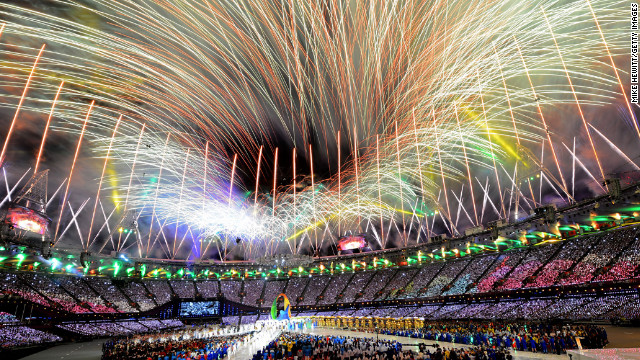 August 12: Fireworks explode over the stadium during the closing ceremony of the London Olympics. The Summer Games started on July 27.
August 12: Fireworks explode over the stadium during the closing ceremony of the London Olympics. The Summer Games started on July 27. 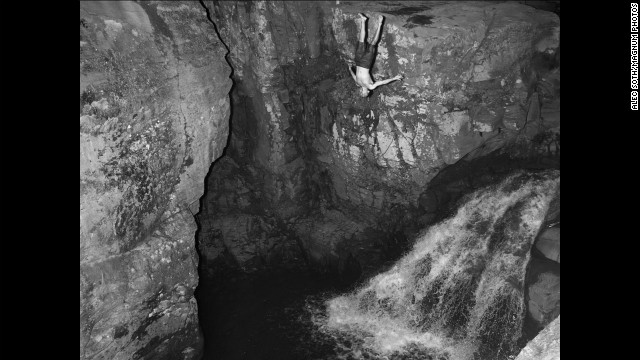 August 13: A man dives into the water near Kaaterskill Falls in the Catskill Mountains in the Hudson Valley.
August 13: A man dives into the water near Kaaterskill Falls in the Catskill Mountains in the Hudson Valley. 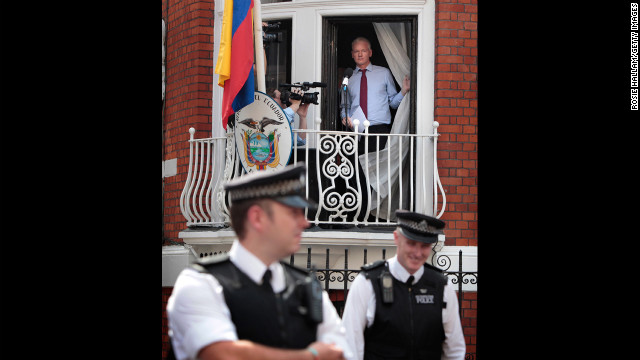 August 19: WikiLeaks founder Julian Assange is seen on the balcony of Ecuador's embassy in London. Facing extradition to Sweden because of allegations of sexual assault, Assange was granted political asylum by Ecuador.
August 19: WikiLeaks founder Julian Assange is seen on the balcony of Ecuador's embassy in London. Facing extradition to Sweden because of allegations of sexual assault, Assange was granted political asylum by Ecuador. 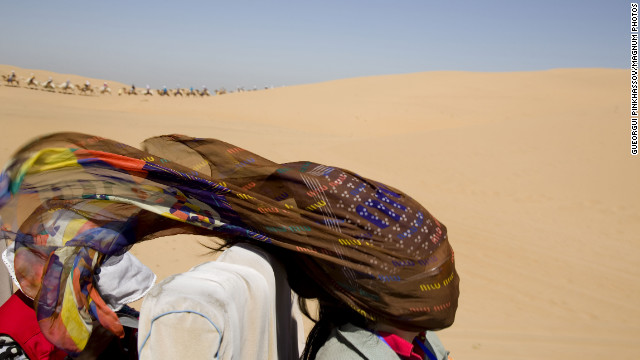 August 21: A woman rides through the Gobi Desert in Mongolia.
August 21: A woman rides through the Gobi Desert in Mongolia. 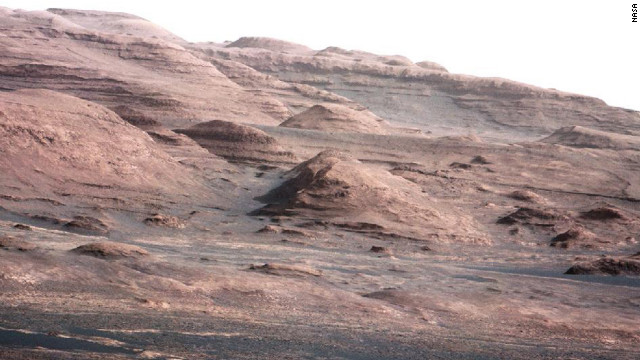 August 23: NASA's Curiosity rover transmits an image that shows the base of Mount Sharp, its eventual destination. Curiosity successfully landed on Mars on August 6.
August 23: NASA's Curiosity rover transmits an image that shows the base of Mount Sharp, its eventual destination. Curiosity successfully landed on Mars on August 6. 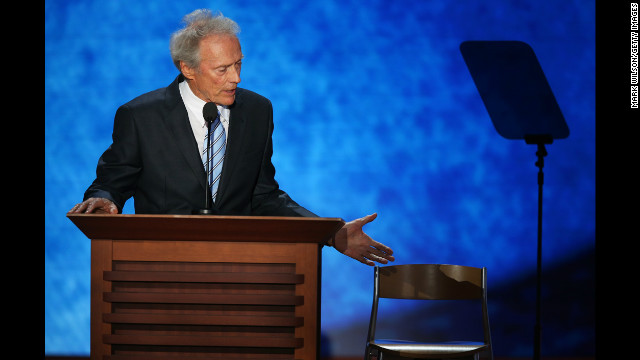 August 30: Actor Clint Eastwood speaks on the final day of the Republican National Convention in Tampa, Florida. During his speech, he addressed an "invisible" President Barack Obama sitting in an empty chair.
August 30: Actor Clint Eastwood speaks on the final day of the Republican National Convention in Tampa, Florida. During his speech, he addressed an "invisible" President Barack Obama sitting in an empty chair. 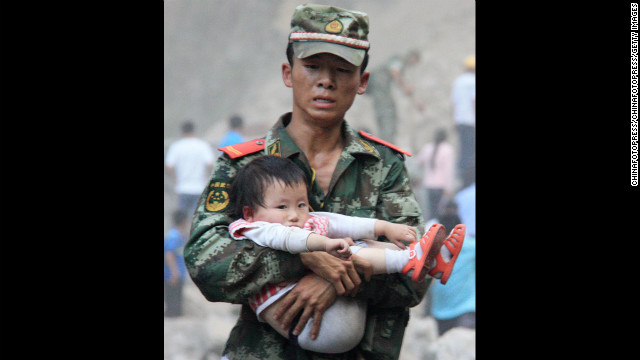 September 9: A rescue worker carries a child in Yiliang County, China. At least 80 people were killed and more than 800 others were injured after two earthquakes jolted southwest China.
September 9: A rescue worker carries a child in Yiliang County, China. At least 80 people were killed and more than 800 others were injured after two earthquakes jolted southwest China. 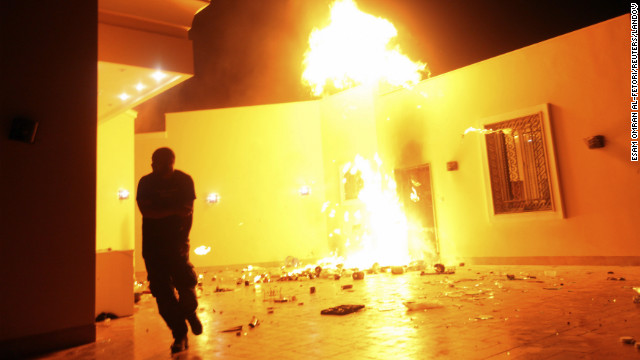 September 11: The U.S. Consulate in Benghazi, Libya, is consumed in flames. Chris Stevens, U.S. ambassador to Libya, was killed in an attack on the compound, as were three other Americans. The Obama administration has been criticized for its response to the attack.
September 11: The U.S. Consulate in Benghazi, Libya, is consumed in flames. Chris Stevens, U.S. ambassador to Libya, was killed in an attack on the compound, as were three other Americans. The Obama administration has been criticized for its response to the attack. 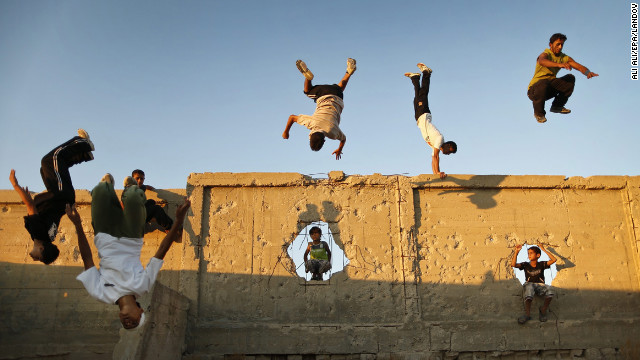 September 17: Palestinian youths practice their parkour skills in Khan Younis in southern Gaza. Parkour athletes run along a route, using obstacles to propel themselves. The practice originiated in France.
September 17: Palestinian youths practice their parkour skills in Khan Younis in southern Gaza. Parkour athletes run along a route, using obstacles to propel themselves. The practice originiated in France. 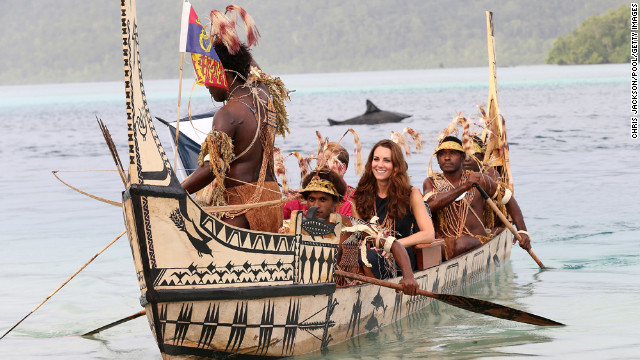 September 17: Catherine, Duchess of Cambridge, and Prince William, Duke of Cambridge, travel in a traditional canoe during a visit to Tavanipupu Island on their Diamond Jubilee tour of the Far East.
September 17: Catherine, Duchess of Cambridge, and Prince William, Duke of Cambridge, travel in a traditional canoe during a visit to Tavanipupu Island on their Diamond Jubilee tour of the Far East. 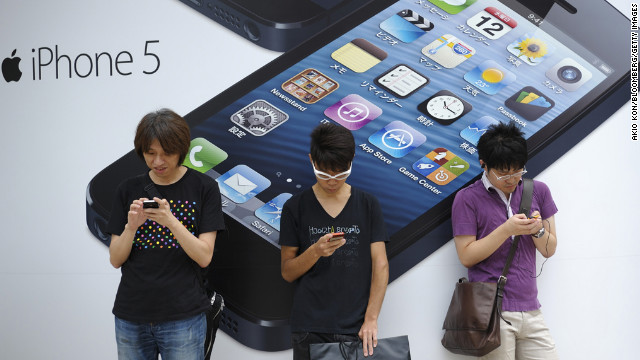 September 21: People stand outside a store in Tokyo before the launch of the iPhone 5. Based on first-day orders, the iPhone 5 became the fastest-selling device Apple has released.
September 21: People stand outside a store in Tokyo before the launch of the iPhone 5. Based on first-day orders, the iPhone 5 became the fastest-selling device Apple has released. 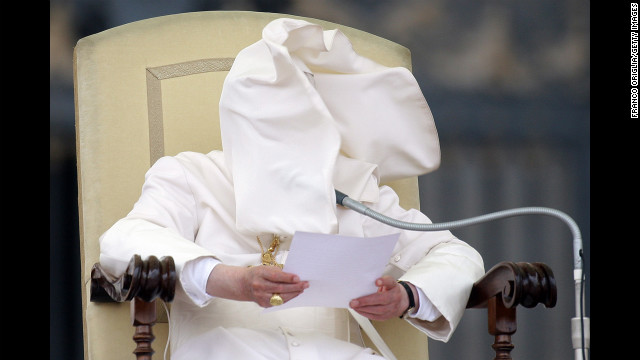 September 26: A gust of wind blows Pope Benedict XVI's cloak into his face in St. Peter's Square in Vatican City. Days later, the pope's former butler, Paolo Gabriele, was convicted of aggravated theft for leaking confidential papal documents. He was sentenced to 18 months in prison.
September 26: A gust of wind blows Pope Benedict XVI's cloak into his face in St. Peter's Square in Vatican City. Days later, the pope's former butler, Paolo Gabriele, was convicted of aggravated theft for leaking confidential papal documents. He was sentenced to 18 months in prison. 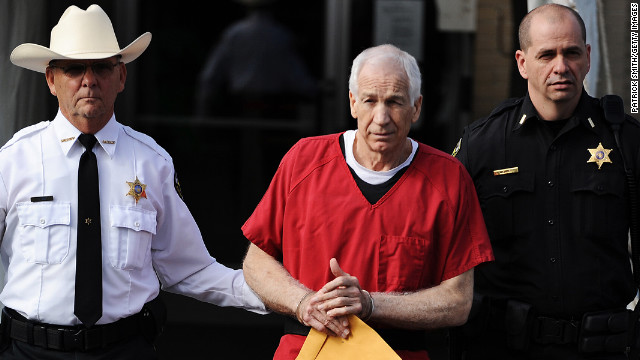 October 9: Former Penn State assistant football coach Jerry Sandusky leaves the courthouse in Bellefonte, Pennsylvania, after being sentenced to at least 30 years in prison. Sandusky, 68, was convicted in June on 45 counts of child sexual abuse.
October 9: Former Penn State assistant football coach Jerry Sandusky leaves the courthouse in Bellefonte, Pennsylvania, after being sentenced to at least 30 years in prison. Sandusky, 68, was convicted in June on 45 counts of child sexual abuse. 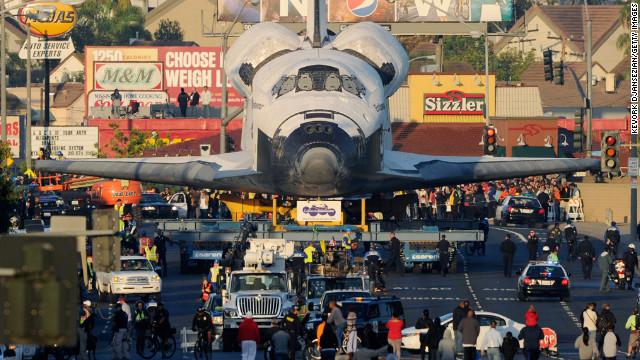 October 12: Space Shuttle Endeavour is transported to The Forum arena for a stopover and celebration in Inglewood, California. The space shuttle was on 12-mile journey from the Los Angeles International Airport to the California Science Center to go on permanent public display.
October 12: Space Shuttle Endeavour is transported to The Forum arena for a stopover and celebration in Inglewood, California. The space shuttle was on 12-mile journey from the Los Angeles International Airport to the California Science Center to go on permanent public display. 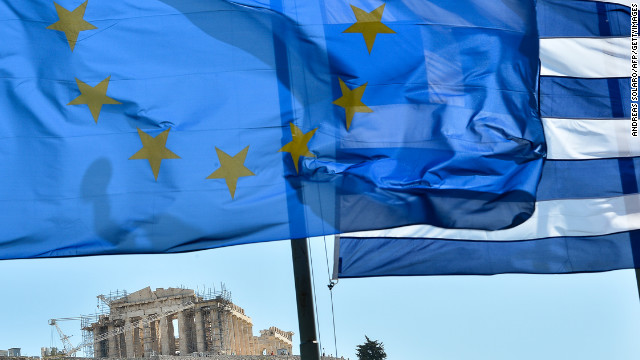 October 12: The European Union wins the Nobel Peace Prize while grappling with the worst crisis since its founding -- devastating debt and the threat of disintegration. The flag of the 27-nation union, left, flies alongside the flag of debt-ridden Greece in front of the Acropolis in central Athens.
October 12: The European Union wins the Nobel Peace Prize while grappling with the worst crisis since its founding -- devastating debt and the threat of disintegration. The flag of the 27-nation union, left, flies alongside the flag of debt-ridden Greece in front of the Acropolis in central Athens. 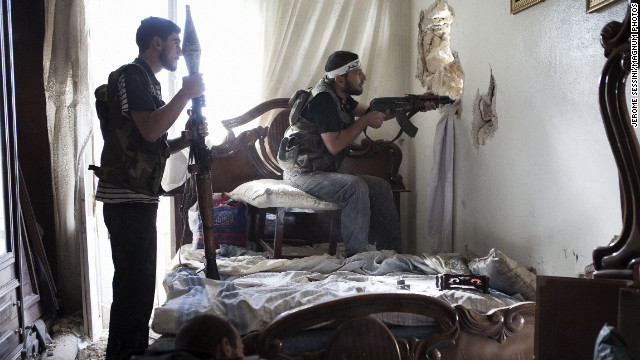 October 19: Free Syrian Army fighters watch a regime army position through a hole in a wall in Aleppo, Syria's most populous city..
October 19: Free Syrian Army fighters watch a regime army position through a hole in a wall in Aleppo, Syria's most populous city.. 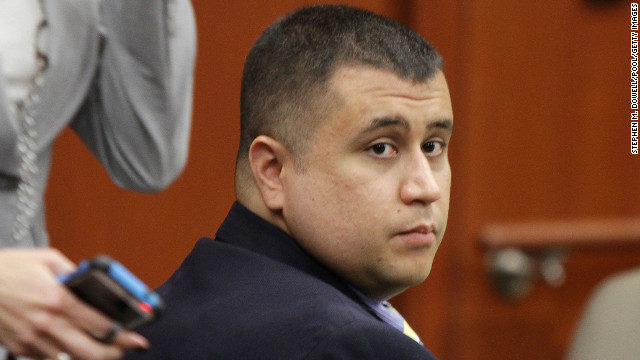 October 19: George Zimmerman watches during his hearing at the Seminole County Courthouse in Sanford, Florida. He will go on trial June 10, 2013, for the killing of 17-year-old Trayvon Martin. The neighborhood watch volunteer is charged with second-degree murder in the February 26 shooting.
October 19: George Zimmerman watches during his hearing at the Seminole County Courthouse in Sanford, Florida. He will go on trial June 10, 2013, for the killing of 17-year-old Trayvon Martin. The neighborhood watch volunteer is charged with second-degree murder in the February 26 shooting.  October 28: The San Francisco Giants celebrate defeating the Detroit Tigers in the 10th inning to win Game Four -- the deciding game -- of the World Series at Comerica Park in Detroit.
October 28: The San Francisco Giants celebrate defeating the Detroit Tigers in the 10th inning to win Game Four -- the deciding game -- of the World Series at Comerica Park in Detroit. 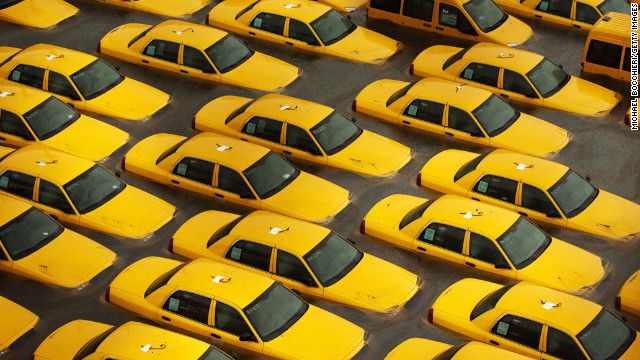 October 30: Taxis sit in a flooded lot in Hoboken, New Jersey, after Superstorm Sandy devastated the region. The storm slammed ashore near Atlantic City, New Jersey, after forming in the Caribbean and sweeping northward, killing 182 people from Haiti to Canada.
October 30: Taxis sit in a flooded lot in Hoboken, New Jersey, after Superstorm Sandy devastated the region. The storm slammed ashore near Atlantic City, New Jersey, after forming in the Caribbean and sweeping northward, killing 182 people from Haiti to Canada. 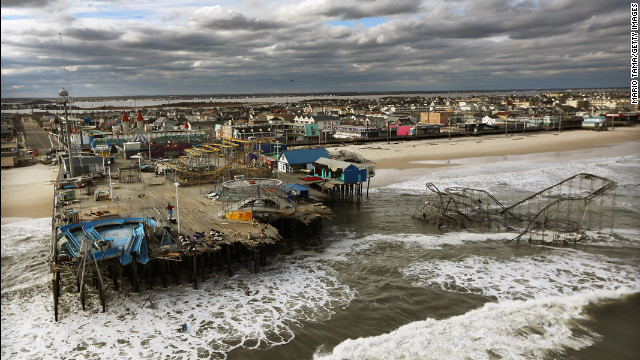 October 31: Waves break in front of a destroyed amusement park wrecked by Superstorm Sandy in Seaside Heights, New Jersey.
October 31: Waves break in front of a destroyed amusement park wrecked by Superstorm Sandy in Seaside Heights, New Jersey. 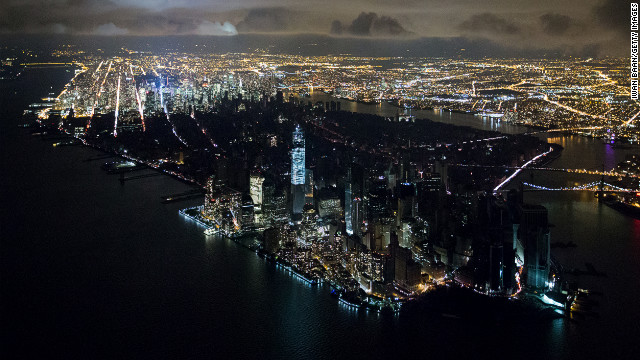 November 1: An aerial view of New York reveals a widespread power outage after Superstorm Sandy. Photographer Iwan Baan credits his camera for allowing him to capture the memorable image from a helicopter at night. He told the Poynter Insitute that with older equipment, the shot would have been impossible.
November 1: An aerial view of New York reveals a widespread power outage after Superstorm Sandy. Photographer Iwan Baan credits his camera for allowing him to capture the memorable image from a helicopter at night. He told the Poynter Insitute that with older equipment, the shot would have been impossible. 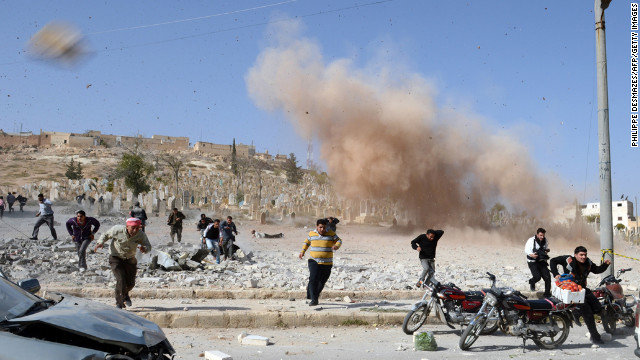 November 4: Syrians take cover as a second bomb explodes during a rescue attempt in a nearby building that was hit during an air raid by government forces in the northern city of Al-Bab.
November 4: Syrians take cover as a second bomb explodes during a rescue attempt in a nearby building that was hit during an air raid by government forces in the northern city of Al-Bab. 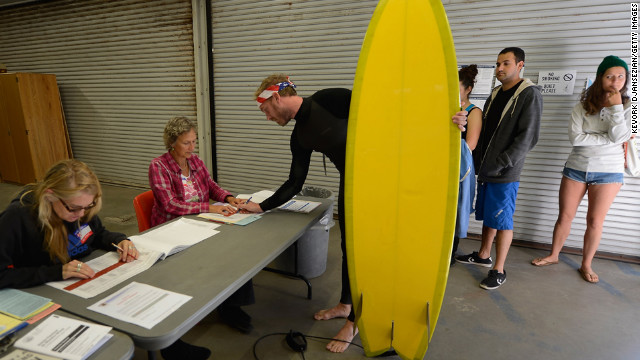 November 6: Mike Wigart picks up his ballot at a polling station in the garage of the Los Angeles County lifeguard headquarters. Americans headed to the polls to vote in the race between President Barack Obama and Republican candidate Mitt Romney.
November 6: Mike Wigart picks up his ballot at a polling station in the garage of the Los Angeles County lifeguard headquarters. Americans headed to the polls to vote in the race between President Barack Obama and Republican candidate Mitt Romney. 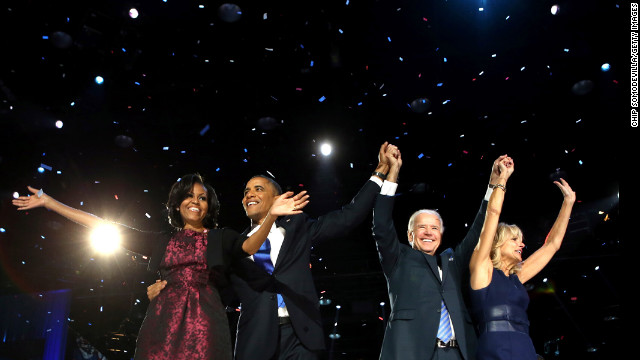 November 6: President Barack Obama stands on stage with first lady Michelle Obama, U.S. Vice President Joe Biden and Dr. Jill Biden after his victory speech on Election Night in Chicago. Obama was re-elected with 332 electoral votes and 51% of the popular vote.
November 6: President Barack Obama stands on stage with first lady Michelle Obama, U.S. Vice President Joe Biden and Dr. Jill Biden after his victory speech on Election Night in Chicago. Obama was re-elected with 332 electoral votes and 51% of the popular vote. 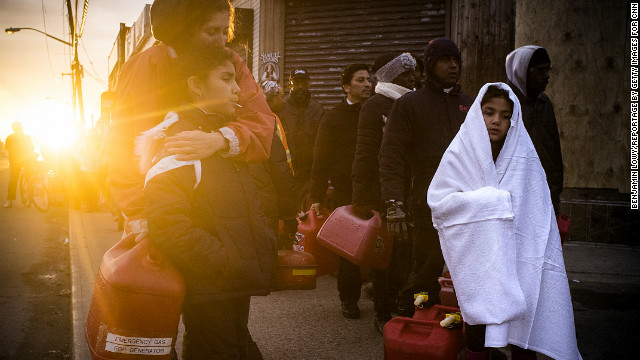 November 8: Hundreds of New Yorkers from Rockaway wait in line for gasoline in the aftermath of Sandy.
November 8: Hundreds of New Yorkers from Rockaway wait in line for gasoline in the aftermath of Sandy. 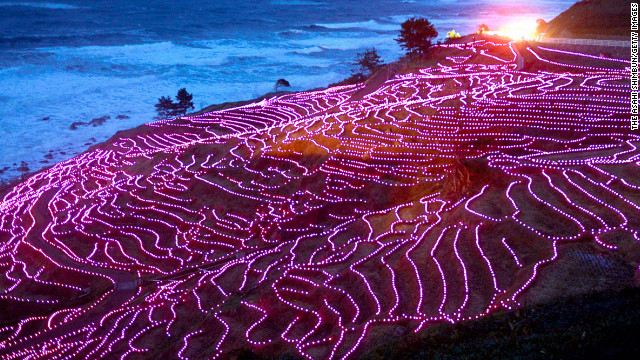 November 10: Terraced rice paddies of Shiroyone Senmaida glow with 20,000 solar-powered pink LED lights in Wajima, Japan, to be recorded in Guinness World Records. The rice paddies were registered as Globally Important Agricultural Heritage Systems last year.
November 10: Terraced rice paddies of Shiroyone Senmaida glow with 20,000 solar-powered pink LED lights in Wajima, Japan, to be recorded in Guinness World Records. The rice paddies were registered as Globally Important Agricultural Heritage Systems last year. 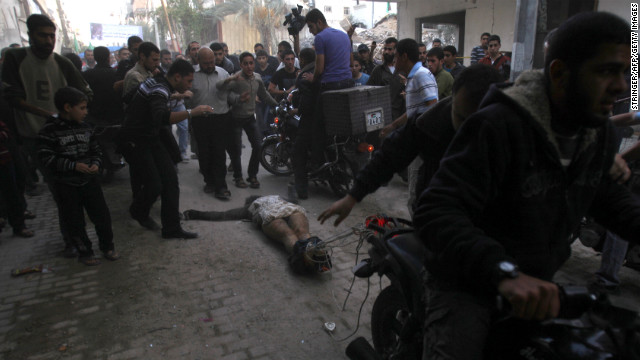 November 20: Men on motorcycles drag the body of a man through the streets of Gaza City. The men dragging the body claimed it was the body of a collaborator and an Israeli spy. Hamas and Israel agreed to a cease-fire on November 21 after eight days of round-the-clock warfare.
November 20: Men on motorcycles drag the body of a man through the streets of Gaza City. The men dragging the body claimed it was the body of a collaborator and an Israeli spy. Hamas and Israel agreed to a cease-fire on November 21 after eight days of round-the-clock warfare. 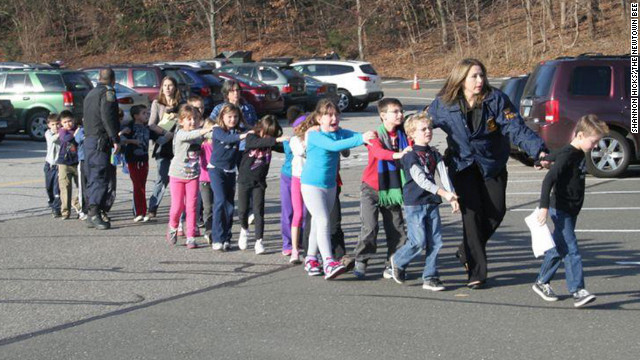 December 14: State police personnel lead children away from Sandy Hook Elementary School in Newtown, Connecticut. A gunman killed 18 children and six adults at the school before he died; two more children died later at a hospital.
December 14: State police personnel lead children away from Sandy Hook Elementary School in Newtown, Connecticut. A gunman killed 18 children and six adults at the school before he died; two more children died later at a hospital. 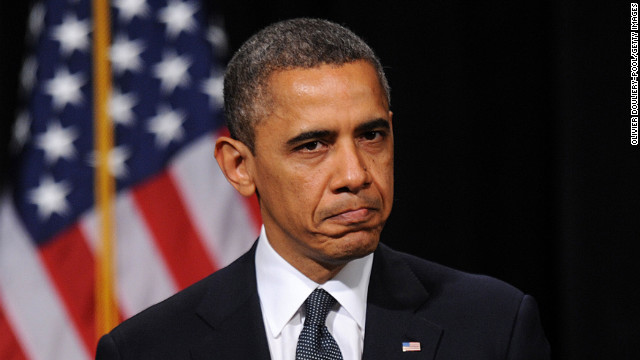 December 16: U.S. President Barack Obama speaks at an interfaith vigil for the shooting victims from Sandy Hook Elementary School at Newtown High School in Newtown, Connecticut. 2012: The year in pictures 2012: The year in pictures 2012: The year in pictures 2012: The year in pictures 2012: The year in pictures 2012: The year in pictures 2012: The year in pictures 2012: The year in pictures 2012: The year in pictures 2012: The year in pictures 2012: The year in pictures 2012: The year in pictures 2012: The year in pictures 2012: The year in pictures 2012: The year in pictures 2012: The year in pictures 2012: The year in pictures 2012: The year in pictures 2012: The year in pictures 2012: The year in pictures 2012: The year in pictures 2012: The year in pictures 2012: The year in pictures 2012: The year in pictures 2012: The year in pictures 2012: The year in pictures 2012: The year in pictures 2012: The year in pictures 2012: The year in pictures 2012: The year in pictures 2012: The year in pictures 2012: The year in pictures 2012: The year in pictures 2012: The year in pictures 2012: The year in pictures 2012: The year in pictures 2012: The year in pictures 2012: The year in pictures 2012: The year in pictures 2012: The year in pictures 2012: The year in pictures 2012: The year in pictures 2012: The year in pictures 2012: The year in pictures 2012: The year in pictures 2012: The year in pictures 2012: The year in pictures 2012: The year in pictures 2012: The year in pictures 2012: The year in pictures 2012: The year in pictures 2012: The year in pictures 2012: The year in pictures 2012: The year in pictures 2012: The year in pictures 2012: The year in pictures 2012: The year in pictures 2012: The year in pictures 2012: The year in pictures 2012: The year in pictures 2012: The year in pictures 2012: The year in pictures 2012: The year in pictures 2012: The year in pictures 2012: The year in pictures 2012: The year in pictures 2012: The year in pictures 2012: The year in pictures 2012: The year in pictures 2012: The year in pictures 2012: The year in pictures 2012: The year in pictures 2012: The year in pictures HIDE CAPTION << <
December 16: U.S. President Barack Obama speaks at an interfaith vigil for the shooting victims from Sandy Hook Elementary School at Newtown High School in Newtown, Connecticut. 2012: The year in pictures 2012: The year in pictures 2012: The year in pictures 2012: The year in pictures 2012: The year in pictures 2012: The year in pictures 2012: The year in pictures 2012: The year in pictures 2012: The year in pictures 2012: The year in pictures 2012: The year in pictures 2012: The year in pictures 2012: The year in pictures 2012: The year in pictures 2012: The year in pictures 2012: The year in pictures 2012: The year in pictures 2012: The year in pictures 2012: The year in pictures 2012: The year in pictures 2012: The year in pictures 2012: The year in pictures 2012: The year in pictures 2012: The year in pictures 2012: The year in pictures 2012: The year in pictures 2012: The year in pictures 2012: The year in pictures 2012: The year in pictures 2012: The year in pictures 2012: The year in pictures 2012: The year in pictures 2012: The year in pictures 2012: The year in pictures 2012: The year in pictures 2012: The year in pictures 2012: The year in pictures 2012: The year in pictures 2012: The year in pictures 2012: The year in pictures 2012: The year in pictures 2012: The year in pictures 2012: The year in pictures 2012: The year in pictures 2012: The year in pictures 2012: The year in pictures 2012: The year in pictures 2012: The year in pictures 2012: The year in pictures 2012: The year in pictures 2012: The year in pictures 2012: The year in pictures 2012: The year in pictures 2012: The year in pictures 2012: The year in pictures 2012: The year in pictures 2012: The year in pictures 2012: The year in pictures 2012: The year in pictures 2012: The year in pictures 2012: The year in pictures 2012: The year in pictures 2012: The year in pictures 2012: The year in pictures 2012: The year in pictures 2012: The year in pictures 2012: The year in pictures 2012: The year in pictures 2012: The year in pictures 2012: The year in pictures 2012: The year in pictures 2012: The year in pictures 2012: The year in pictures HIDE CAPTION << <
{ 0 comments... read them below or add one }
Post a Comment